The international leg of the Beijing Olympic Torch Relay, when finished, not only will be the longest relay route, but also become the first
Olympic relay to reach six of the seven continents on earth, the first to reach the summit on Mt. Everest and have the most torchbearers in
Olympic history. The relay began in Olympia, Greece on 25 March with the lighting of the flame by the rays of the sun and continued to Beijing,
where the official relay was started. The relay went on to 19 other countries and ended in Hong Kong and Macau on 3 and 4 May.
Photos
Choose a relay city to view thumbnails.
Almaty |
Istanbul |
St. Petersburg |
London |
Paris |
San Francisco |
Buenos Aires |
Dar es Salaam |
Muscat |
Islamabad |
New Delhi |
Bangkok |
Kuala Lumpur |
Jakarta |
Canberra |
Nagano |
Seoul |
Pyongyang |
Ho Chi Minh City |
Taipei |
Hong Kong |
Macau
1st leg of the Torch Relay- Almaty, Kazakhstan. 2 April 2008
The first torchbearer in Almaty, where the Olympic torch arrived for the first time ever, was the President of Kazakhstan, Nursultan Nazarbaev. The route ran 20 km from Medeo stadium to Astana Square. Among other 79 torchbearers were Olympic champions Bakhtiyar Artayev, Yermakhan Ibraimov (boxing), Yuriy Melnichenko, Zaksylik Ushkempirov (wrestling), Anatoly Khrapaty (weightlifting); the first Olympic champion for independent Kazakhstan Vladimir Smirnov (cross-country skiing) skied his lap on a special artificial snow track; famous Kazakh singer Roza Rymbaeva ran her lap singing a song about Kazakhstan.




 |




 |




 |



 |
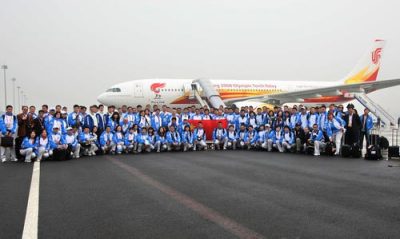 | | The Torch Relay team in Beijing, about to depart for Almaty, Kazakhstan. |
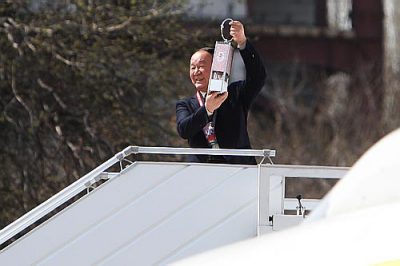 | | Jiang
Xiaoyu, Executive Vice President of the Beijing Organizing Committee of the 2008 Olympic Games (BOCOG), disembarks with the Sacred Flame
in Almaty, Kazakhstan. |
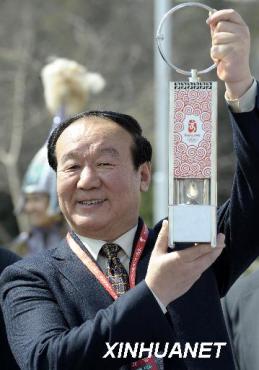 | | Jiang
Xiaoyu with the Olympic flame lantern. |
 | | Jiang
Xiaoyu greets officials in Almaty, Kazakhstan. |
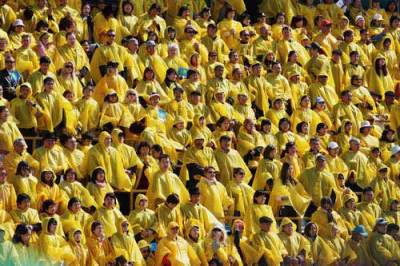 | | Almaty
people welcome the Olympic flame. |
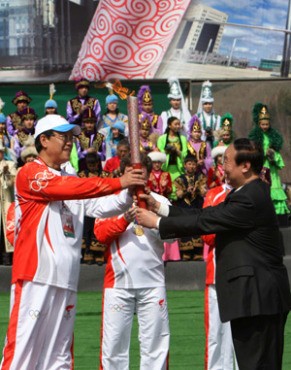 | | Jiang Xiaoyu (R), the executive vice president for the Beijing Organizing Committee for the Olympic Games (BOCOG), hands over the torch to Zhang Xiyun, Chinese Ambassador to Kazakhstan. |
 | | Zhang Xiyun
(R), Chinese Ambassador to Kazakhstan, hands over the torch to Nursultan Nazarbayev, president of Kazakhstan. |
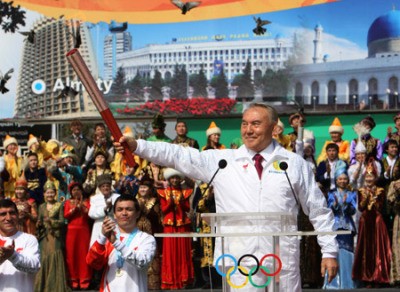 | | Nursultan
Nazarbayev, president of Kazakhstan, shows the torch to the public before he starts to run as the first torchbearer of the country. |
 | | Nursultan Nazarbayev (L), president of Kazakhstan and the first torchbearer of the country, kindles the torch of the next torchbearer. |
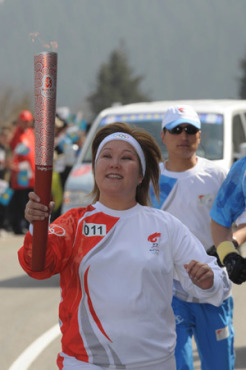 | | Torch
bearer Atakhanova runs with the torch. |
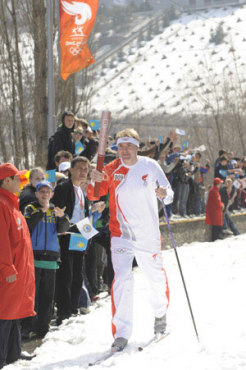 | | Torch
bearer Smirnov Vladimir runs with the torch. |
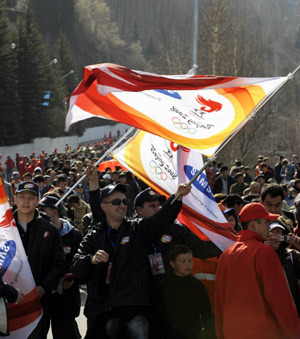 | | Spectators
wave flags at the Medeo skating rink. |
 | | The sixth Torch bearer Zhamilya Yunusbaeva
(R) ignites the torch from Kazakhstan swimmer Olegrabota at the Dam. |
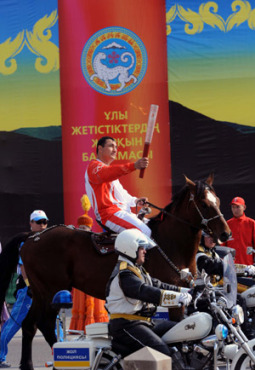 | | Torchbearer
Dildabakov Mukhtarkhan rides with the torch. |
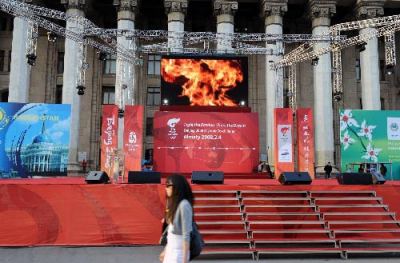
The stage is set for the Olympic Torch
Relay. |
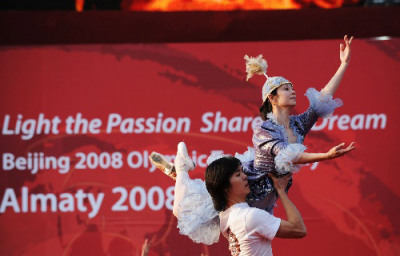 | | Dancers
rehearse for the celebration ceremony of Beijing Olympic torch relay. |
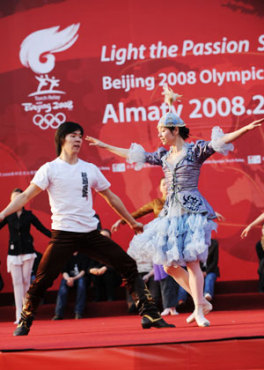 | | Dancers
rehearse for the celebration ceremony of Beijing Olympic torch relay. |
 | | The site of
a grand celebration which is held to greet the arrival of the Olympic torch. |
 | | Yermakhan
Ibraimov, a boxing gold medalist at the 2000 Olympic Games, holds the Olympic Torch after lighting the culdron. |
|
2nd leg of the Torch Relay- Istanbul, Turkey. 3 April 2008
The torch relay leg in Istanbul, held on 3 April, started on Sultanahmet Square and finished in Taksim Square. On the 20 km long route the Olympic flame was carried by 80 torchbearers, the first being a figure skater Tuğba Karademir and the last — the Olympic champion in weightlifting Taner Sağır.


 |


 |


 |


 |
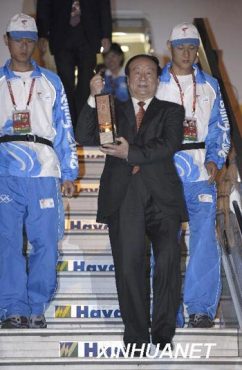 | | The Sacred Flame arrives in Istanbul, Turkey, carried by Jiao Xiaoyu, Executive Vice President of the Beijing Organizing Committee of the 2008 Olympic Games (BOCOG). |
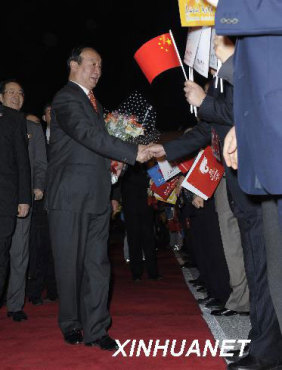 | | Jiang Xiaoyu meets the vice- governor of Istanbul. |
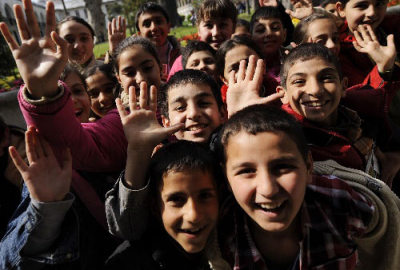 | | On 31 March, Turkish students happily welcome Chinese journalists at the city's signature St. Sophia Square (adjacent to Sultan Ahmet Square), the starting point of the relay in Istanbul. |
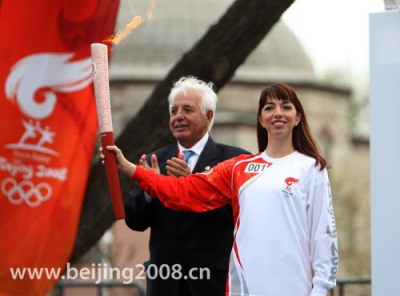 | | Turkish Olympic Committee (TMOK) President Togay Bayatli(l) and the first torch bearer Tugba Karademir(r). |
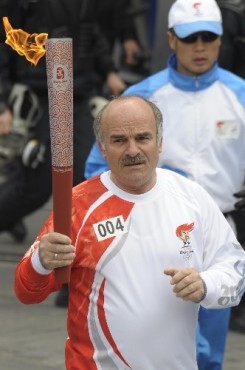 | |
Torchbearer Ozer runs with the torch. |
 | |
Torchbearer Nese Cetin holds the torch. |
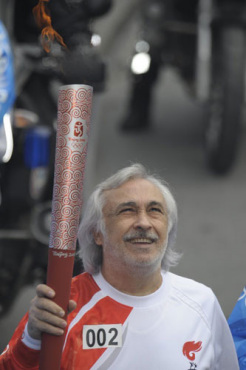 | |
Torchbearer Mujdat runs with the torch. |
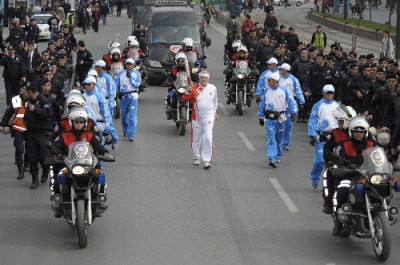 | |
Torchbearer Goksel runs with the torch. |
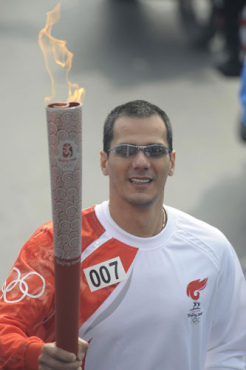 | |
Torchbearer Devrimcenk runs with the torch. |
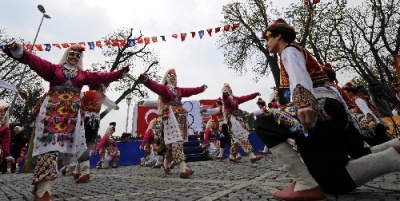 | | Primary
school students perform while waiting for the arrival of the torch. |
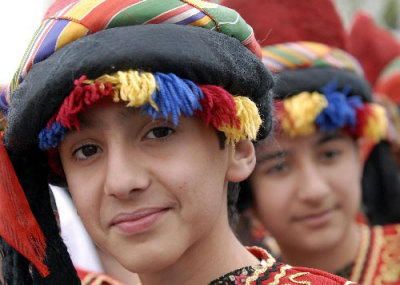 | | Two boys dressed in traditional attire wait for the arrival of the torch. |
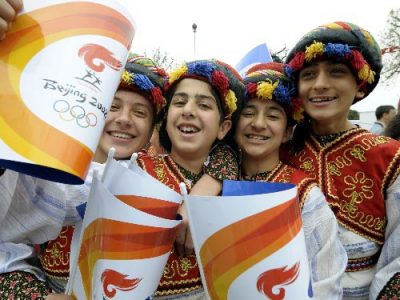 | | Group of children dressed in traditional attire wait to see the torch. |
|
3rd leg of the Torch Relay- St. Petersburg, Russia. 5 April 2008
On 5 April the Olympic torch arrived at St. Petersburg, Russia. The length of the torch relay route in the city was 20 km, with the start at the Victory Square and finish at the Palace Square. Among the 80 torchbearers were Olympic champions Lyubov Yegorova (cross-country skiing), Viktor Zhdanovich (fencing), Vladimir Salnikov, Alexander Popov, Sergey Kopliakov, Andrey Krylov (swimming), Alexander Dityatin (artistic gymnastics), Tatyana Kazankina (athletics), Anatoly Alyabyev (biathlon), Evgeni Plushenko, Tatiana Totmianina, Maxim Marinin, Anton Sikharulidze, Alexei Urmanov, Oksana Kazakova, Artur Dmitriev, Oleg Vasiliev (figure skating), Svetlana Zhurova (speed skating), and others; figure skating coach Tamara Moskvina; mixed martial artist Fedor Emelianenko; polar explorers Robert Swan, Artur Chilingarov; cosmonaut Valentina Tereshkova; actress Alisa Freindlich; football player Andrei Arshavin and other prominent people.







 |







 |







 |






 |
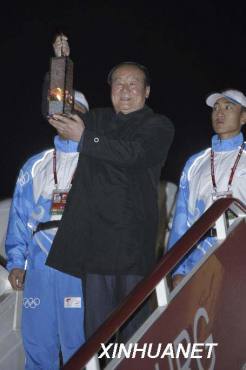 | | BOCOG Executive Vice-President Jiang Xiaoyu carries the sacred flame's safty lantern from the airplane in St. Petersburg, Russia. |
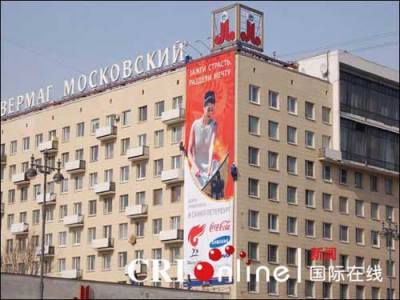 | | St. Petersburg decorated to welcome the flame. |
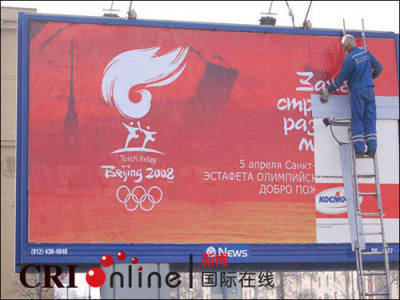 | | St. Petersburg decorated to welcome the flame. |
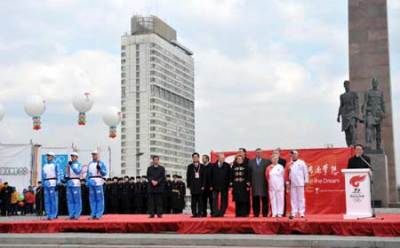 | | Victory Square hosts the send-off ceremony for the Olympic torch relay. |
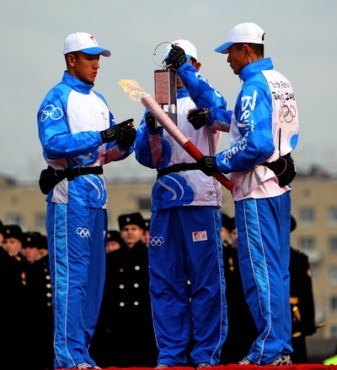 | | Three flame escorts kindle the Olympic torch as the torch relay kicks off at Victory Square. |
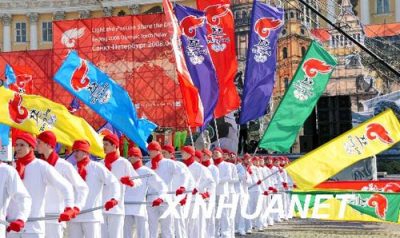 | | A grand ceremony is held to welcome the sacred flame. |
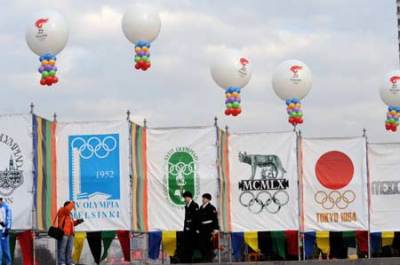 | | Flags of the past Olympic Games are displayed at the Victory Square in St. Petersburg, Russia. |
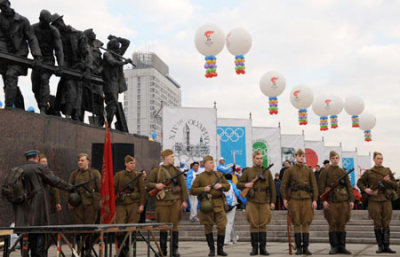 | | Honor guards in line at Victory Square, start of the Olympic torch relay. |
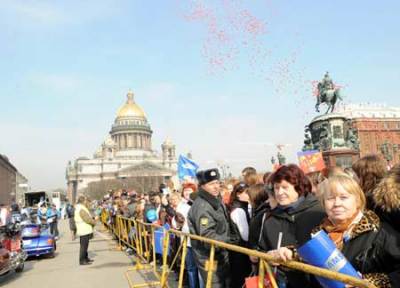 | | People wait along the street to watch the torch relay. |
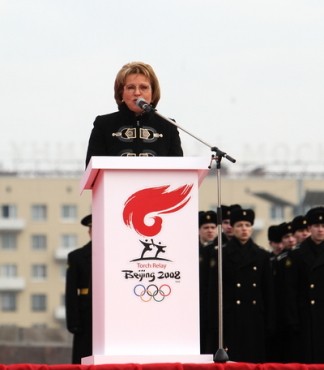 | | Mayor of St. Petersburg Valentina Matviyenko speaks at the torch relay ceremony at Victory Square. |
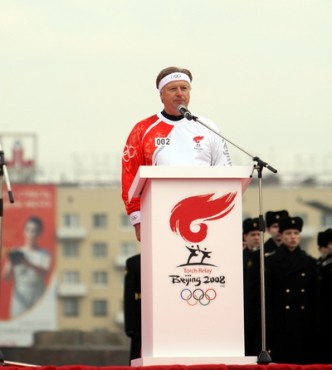 | | Russian Olympic Committee (ROC) Chairman Leonid Tyagachev speaks at the torch relay ceremony at Victory Square. |
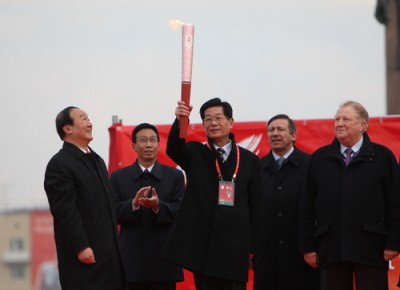 | | Chinese ambassador to Russia Liu Guchang holds the torch at Victory Square. |
 | | Chinese ambassador to Russia Liu Guchang(l) gives the torch to Mayor of St. Petersburg Valentina Matviyenko(r) at Victory Square. |
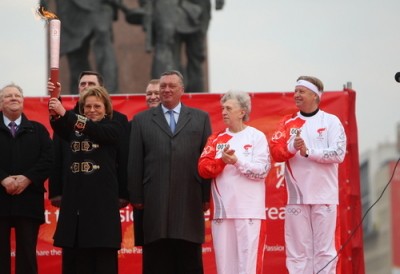 | | Mayor of St. Petersburg displays Olympic torch. |
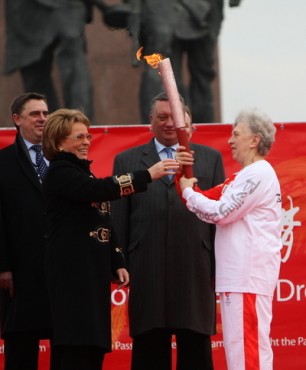 | | Mayor of St. Petersburg Valentina Matviyenko(l) gives the torch to torchbearer Galina Zybina, Russia's shot put gold medallist at the 1952 Summer Olympics held in Helsinki. |
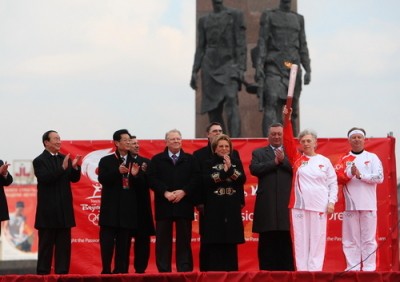 | | First torchbearer Galina Zybina displays Olympic torch. |
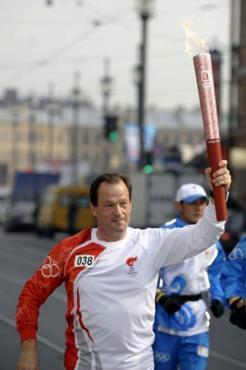 | | A torchbearer runs with the Olympic torch. |
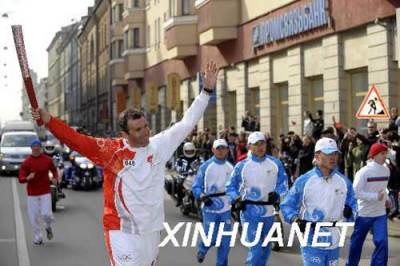 | | A torchbearer runs with the Olympic torch. |
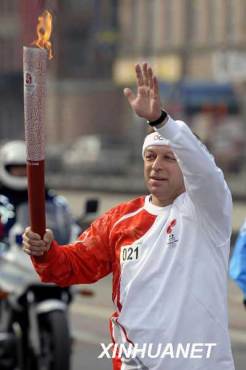 | | A torchbearer runs with the Olympic torch. |
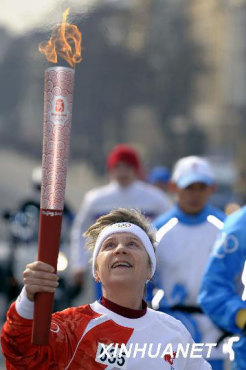 | | A torchbearer runs with the Olympic torch. |
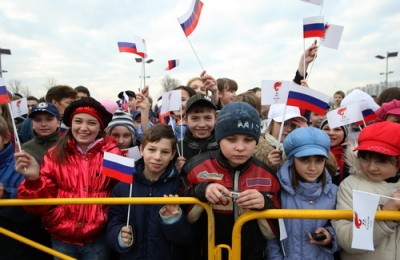 | | Russian children wait to watch the Olympic torch relay. |
 | | A torchbearer runs with the Olympic torch. |
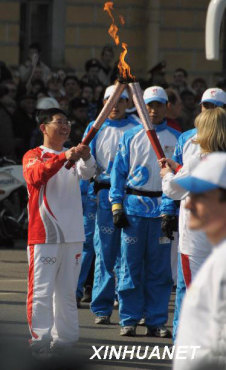 | | Chinese torchbearer Tian Erlong passes the flame to the next bearer during torch relay. |
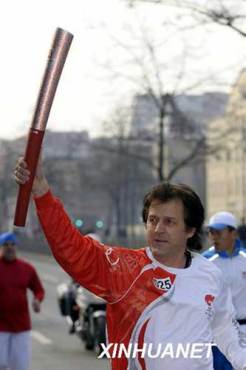 | | A torchbearer runs with the Olympic torch. |
 | | A torchbearer runs with the Olympic torch. |
 | | People wait to watch the Olympic torch relay. |
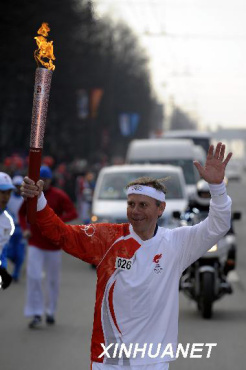 | | A torchbearer runs with the Olympic torch. |
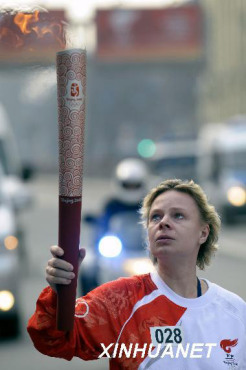 | | A torchbearer runs with the Olympic torch. |
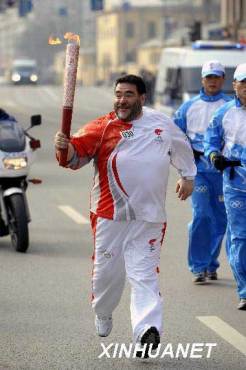 | | A torchbearer runs with the Olympic torch. |
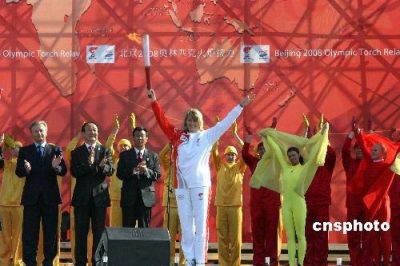 | | The last torchbearer, Svetlana Zhurova, displays the torch at the end of the torch relay. |
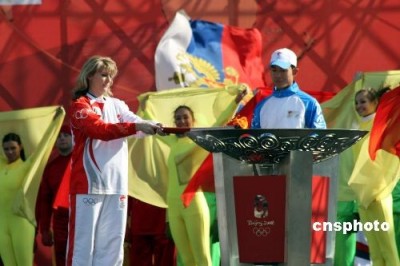 | | The last torchbearer, Svetlana Zhurova, kindles the cauldron during the closing ceremonies of the torch relay. |
|
4th leg of the Torch Relay- London, England. 6 April 2008
The torch relay leg held in London on 6 April began in Wembley, passed through the City of London, and eventually ended at the O2 in the eastern part of the city. Torchbearers included Kelly Holmes, Sir Trevor McDonald, Vanessa Mae, Kevin Pieterson and Amara Karan. The 48 km (31 mi) leg took a total of seven and a half hours to complete, and attracted protests by pro-Tibet and pro-Human Rights supporters, prompting changes to the planned route and an unscheduled move onto a bus.






 |






 |






 |






 |
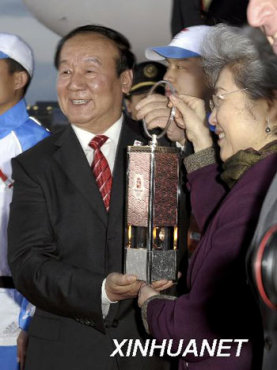 | | The Beijing Olympic flame arrived in London, the host city of the 2012 Olympics, at 18:00 GMT on 5 April. Jiang Xiaoyu, Executive Vice President of BOCOG, holds the Olympic flame with Fu Ying, Chinese ambassador to UK. |
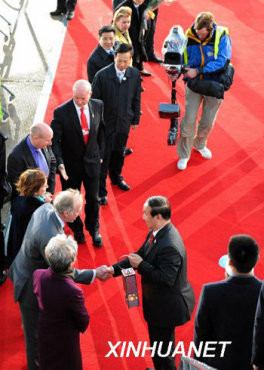 | | Jiang Xiaoyu holds the Olympic flame safety lantern as he greets representatives from London at Heathrow Airport. |
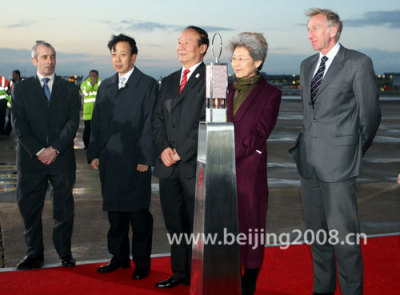 | | Jiang Xiaoyu holds the Olympic flame safety lantern as he greets representatives from London at Heathrow Airport. |
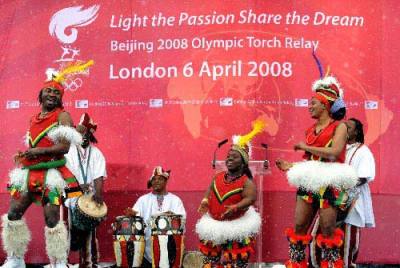 | | Actors perform at the set-off ceremony for the Olympic torch relay held in Wembley Stadium, London |
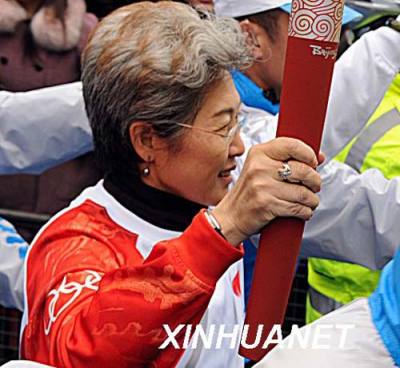 | | 38th torchbearer, Chinese ambassador to Britain, Fu Ying, participates in the torch relay. |
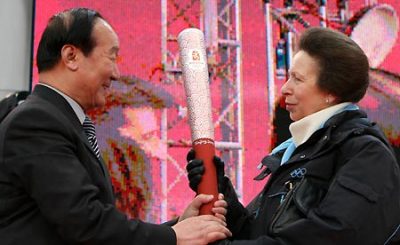 | | Jiang Xiaoyu gives the torch to Princess Anne. |
 | | Jiang Xiaoyu(r) gives the torch to Deputy Mayor of London Nicky Gavron(c) at Wembley Stadium, London. |
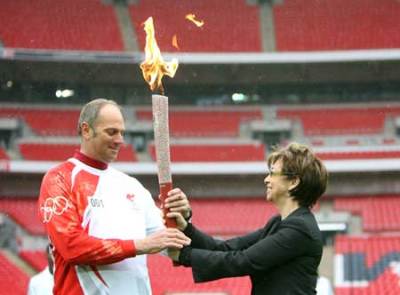 | | Deputy Mayor of London Nicky Gavron passes the torch to Steve Redgrave, a five-time Olympic rowing gold medalist and first torchbearer for the London leg of the Olympic torch relay. |
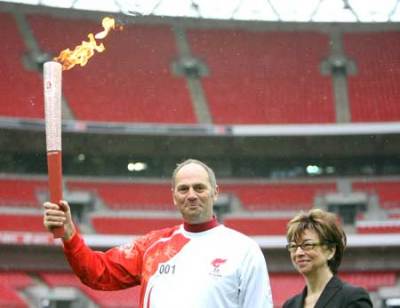 | | Steve Redgrave, a five-time Olympic rowing gold medalist and first torchbearer for the London leg of the Olympic torch relay, displays the torch. |
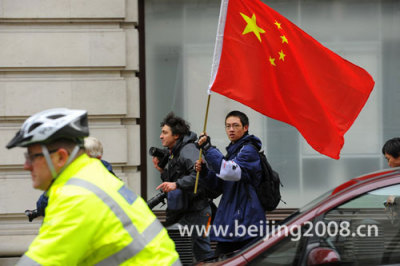 | | A student carries a Chinese flag and follows the Olympic torchbearers. |
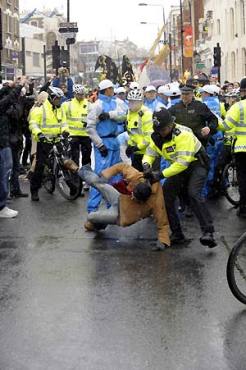 | | A local policeman clashes with a protester during the Olympic torch relay. A few pro-Tibet demonstrations took place along the route, forcing a change in planning, which included taking the torch on a bus for part of the relay. |
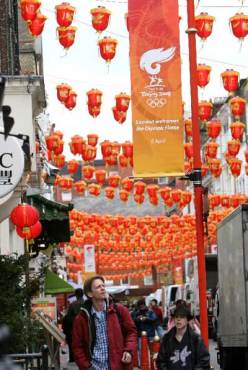 | | London's China Town, decorated with lanterns and banners to welcome the flame. |
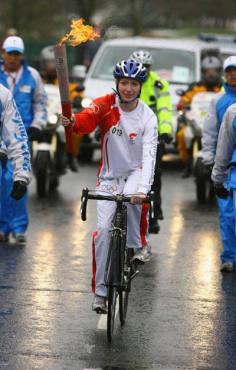 | | Torchbearer carries torch by bicycle. |
 | | Torchbearer Giles Emily holds the torch during the Olympic torch relay. |
 | | Torchbearer Cheyenne Green holds the torch on a double decker bus during the Olympic torch relay, after the original route was disrupted by pro-Tibet protestors. |
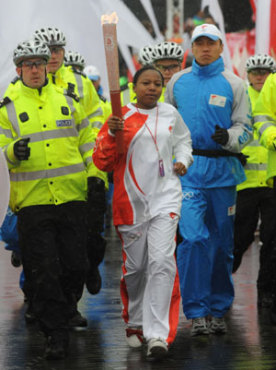 | | Torchbearer Cheyenne Green runs with the torch during the Olympic torch relay. |
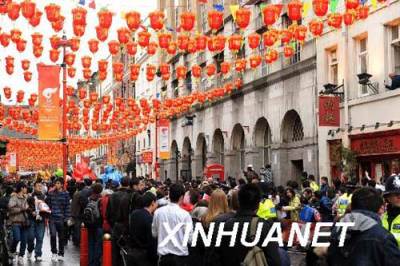 | | Red lanterns are hung to greet the arrival of the sacred flame in London's Chinatown. |
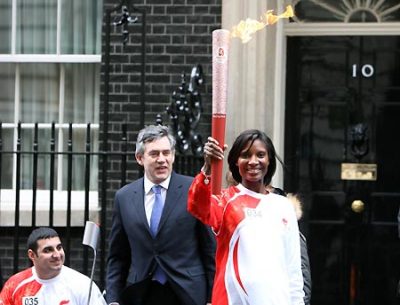 | | Torchbearer Denise Lewis(r) holds the torch as British Prime Minister Gordon Brown(2nd l) and disabled torchbearer Ali Jawad(1st l) smile outside 10 Downing Street, London. |
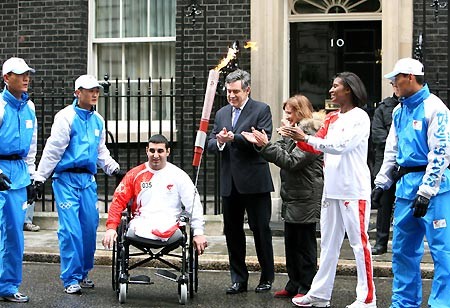 | | British Prime Minister Gordon Brown(4th l), British Olympic Minister Tessa Jowell(5th l) and torchbearer Denise Lewis(6th l) applaud as disabled Paralympian Ali Jawad(3rd l) becoms the 35th torchbearer, outside 10 Downing Street, London. |
 | | Paralympian powerlifter Ali Jawad, 18, carries the Olympic Torch. |
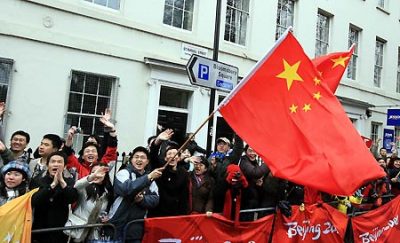 | | People crowd in Chinatown to watch the Olympic torch relay. |
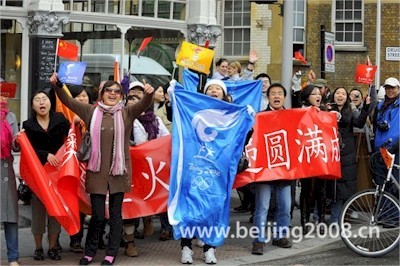 | | Zhou Xiu, an economics student from Shandong University, currently working as an intern at Lehman Brothers Investment Bank, was among the spectators who excitedly greeted the Olympic flame in London. |
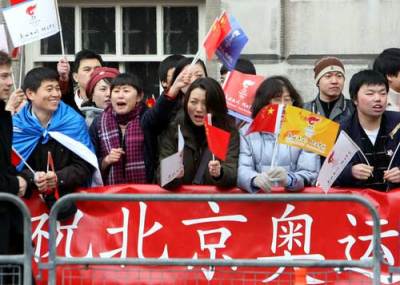 | | Chinese people in London welcome the Olympic flame during the torch relay. |
 | | TV news anchor Sir Trevor McDonald carries the Olympic Torch. |
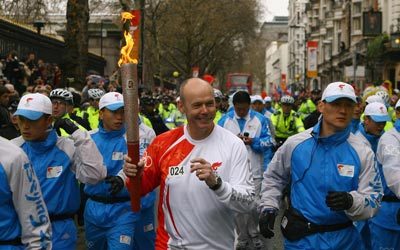 | | Former England rugby coach Sir Clive Woodward carries the Olympic Torch. |
 | | Chinese students studying in London gather to welcome the Olympic Torch. |
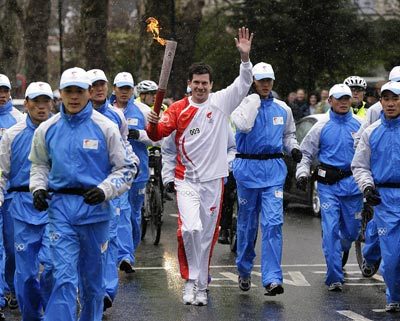 | | British tennis player Tim Henman runs with the torch, from Notting Hill Gate, during his leg of the Beijing Olympics torch relay. |
 | | Chinese British queue to welcome the arrival of the Olympic torch during the torch relay |
|
5th leg of the Torch Relay- Paris, France. 7 April 2008
The torch relay leg in Paris began on the first level of the Eiffel Tower and finished at the Stade Charléty. French athlete Stéphane Diagana was the first torchbearer. Other torchbearers included David Douillet, Marie-José Pérec, Jin Jing, Teddy Riner, Arnaud Di Pasquale, Pi Hongyan and Mary Pierce.
The relay was initially supposed to cover 28 km, but it was shortened at the demand of Chinese officials following widespread protests by pro-Tibet and human rights activists, who repeatedly attempted to disrupt, hinder or halt the procession.
A scheduled ceremony at the town hall was cancelled at the request of the Chinese authorities, and, also at the request of Chinese authorities, the torch finished the relay by bus instead of being carried by athletes.




 |




 |




 |




 |
 | | The Beijing Olympic flame arrived at Charles De Gaulle airport in Paris at 21:40 GMT. Executive Vice President of BOCOG, Jiang Xiaoyu(r), and China's ambassador to France, Kong Quan(l), posed for photos with French representatives. |
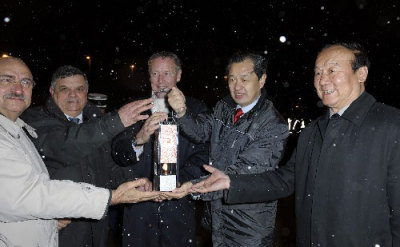 | | The Olympic Flame Safety Lantern surrounded by Jiang Xiaoyu(r), China's ambassador to France, Kong Quan(2nd r) and French officials. |
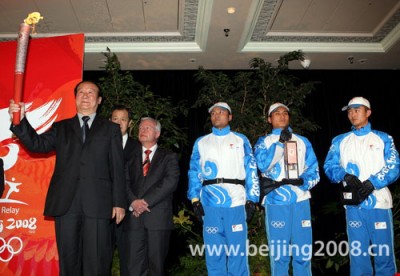 | | France's most famous landmark, the Eiffel Tower, was the starting point of the Olympic torch relay in Paris. The first floor of the structure hosted the launching ceremony. |
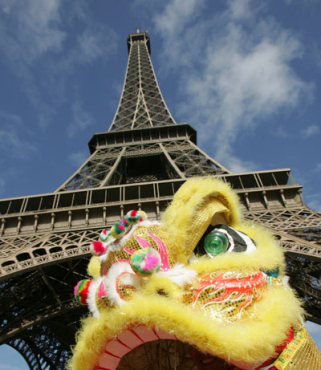 | | China's traditional lion dance is performed near the Eiffel Tower, Paris. |
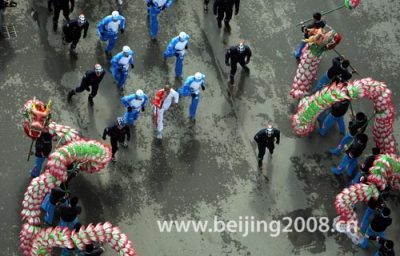 | | A torchbearer holds the torch as China's traditional lion dance is performed during the torch relay. |
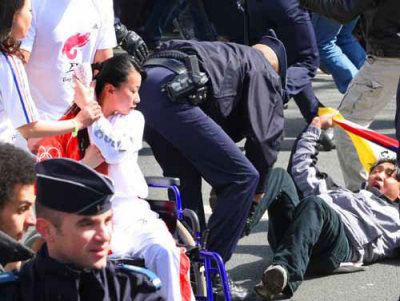 | | Jin Jing, a Paralympic fencer, protected the torch as a pro-Tibetan protestor attempted to seize it from her. Amid excessive protests, the relay route through Paris was shortened significantly to avoid any further clashes. |
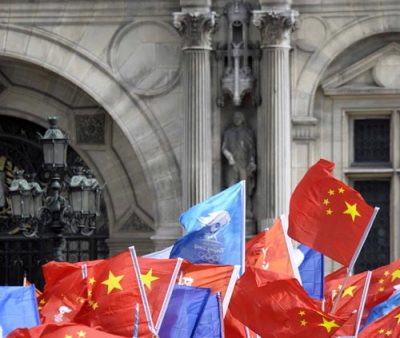 | | Flags are seen along the torch relay route in Paris. |
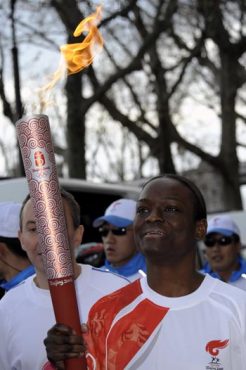 | | A torchbearer carries flame during the torch relay. |
 | | A torchbearer carries flame during the torch relay. |
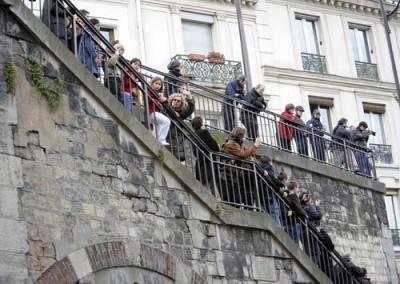 | | Spectators watch the torch relay. |
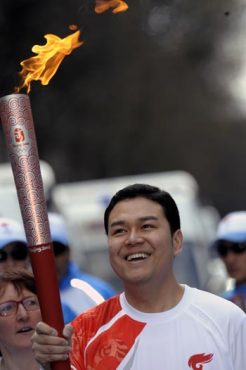 | | A torchbearer carries flame during the torch relay. |
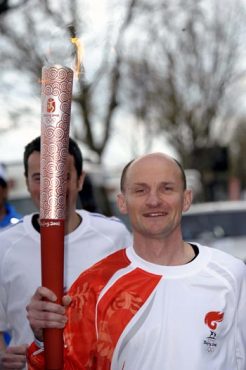 | | A torchbearer carries flame during the torch relay. |
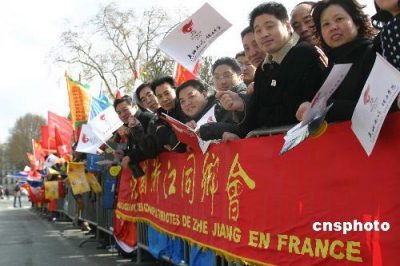 | | Spectators watch the torch relay. |
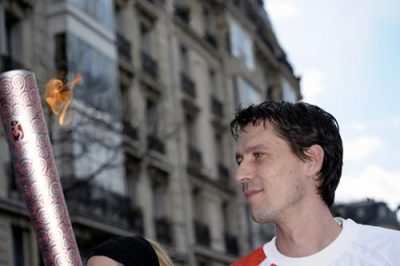 | | A torchbearer carries flame during the torch relay. |
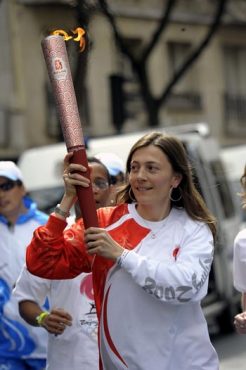 | | A torchbearer carries flame during the torch relay. |
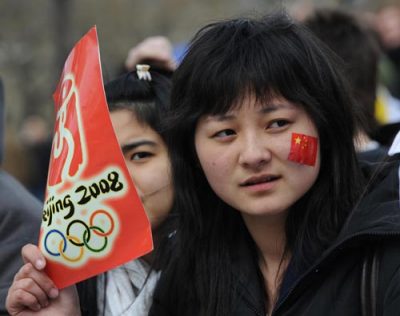 | | Chinese student studying abroad welcomes the sacred flame. |
 | | Spectators watch the torch relay. |
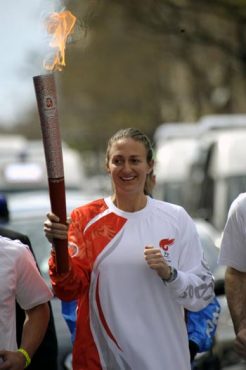 | | A torchbearer carries flame during the torch relay. |
 | | Lighting of the relay culdron, marking the end of the torch relay through Paris. |
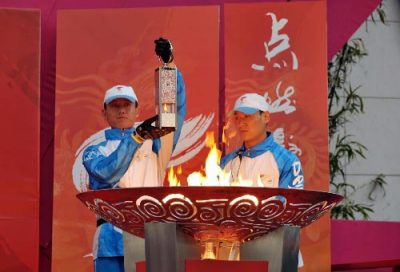 | | The torch relay safety lantern is rekindled from the culdron at the end of the torch relay, in order to ensure the eternity of the flame lasts between relay route stops. The flame has remained lit from the time of the initial lighting in Olympia, Greece on 30 March 2008 and will remain lit until the end of the XXIX Olympiad in Beijing on 24 August 2008. |
|
6th leg of the Torch Relay- SanFrancisco, United States. 9 April 2008
On the day of the relay officials diverted the torch run to an unannounced route. The start was at McCovey Cove, where Norman Bellingham of the U.S. Olympic Committee gave the torch to the first torchbearer, Chinese 1992 Olympic champion swimmer Lin Li. The planned closing ceremony at Justin Herman Plaza was cancelled and instead, a ceremony was held at San Francisco International Airport. The route changes avoided many supporters and protestors, alike. As crowds found out there would be no closing ceremony at Justin Herman Plaza, there were angry reactions. One demonstrator was quoted as saying that the route changes were an effort to "thwart any organized protest that had been planned." San Francisco Board of Supervisors President Aaron Peskin, a critic of Mayor Gavin Newsom, said that it was a
"cynical plan to please the Bush State Department and the Chinese government because of the incredible influence of money."
Newsom, on the other hand, said he felt it was in "everyone's best interest" and that he believed people had been "afforded the right to protest and support the torch" despite the route changes.
Peter Ueberroth, head of the U.S. Olympic Committee, praised the route changes, saying, "The city of San Francisco, from a global perspective, will be applauded." People who saw the torch were surprised and cheered. The cost to the city for hosting the event was reported to be USD 726,407.75, nearly half of which has been recovered by private fundraising. Mayor Gavin Newsom said that "exponential" costs associated with mass arrests were avoided by his decision to change the route in consultation with police chief Heather Fong.





 |





 |





 |






 |
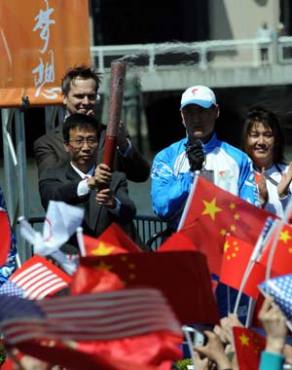 | | Liu Jigang(l), an official of 2008 Beijing Olympic Games Organizing Committee, displays the torch at the McCovey Cove, the start of the Olympic torch relay. |
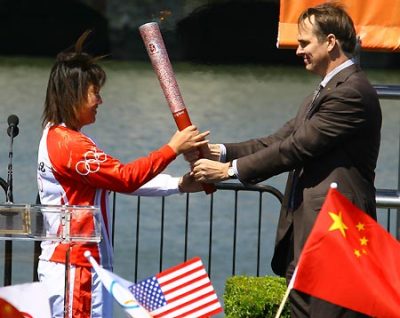 | | Norman Bellingham(r), chief Operating Officer of the United States Olympic Committee, gives the torch to San Francisco's first torchbearer, Lin Li, at McCovey Cove, start of the Olympic torch relay. |
 | | Lin Li displays the torch. |
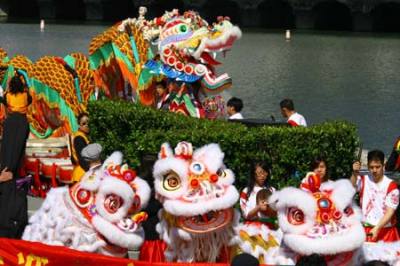 | | Dragon and lion dances are staged to welcome the Olympic flame at McCovey Cove, start of the Olympic torch relay. |
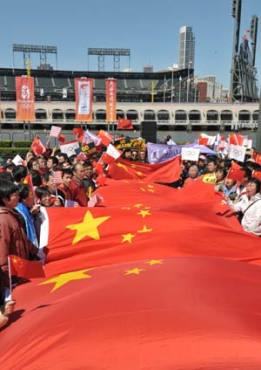 | | Spectators await the Olympic flame. |
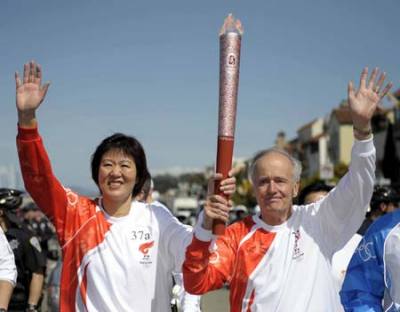 | | Torchbearer Lang Ping(l), now head of the U.S. women's volleyball team, and torchbearer James Dolan carry the torch. |
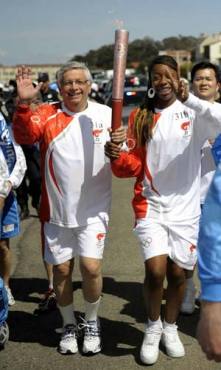 | | Torchbearer David Stern(l), National Basketball Association commissioner, and a female torchbearer carry the torch. |
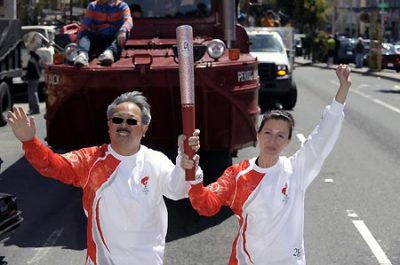 | | Torchbearer Edwin M. Lee(l), the city administrator of San Francisco, and a female torchbearer carry the torch. |
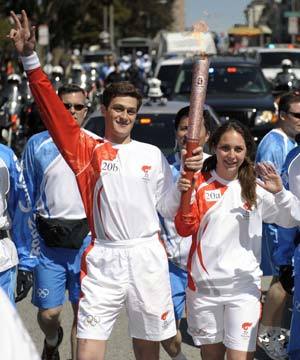 | | Torchbearers David Drabkin(l) and Lisa Hartmayer carry the torch. |
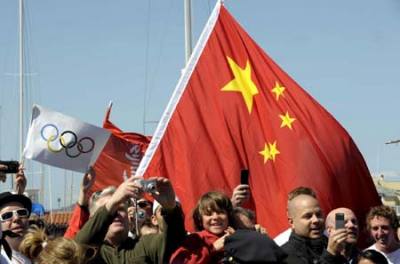 | | Spectators await the Olympic flame. |
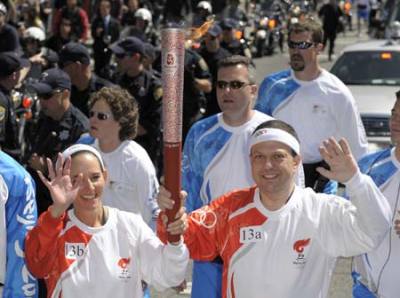 | | Torchbearers Cherice Gerson(l) and Mark Meyers carry the torch. |
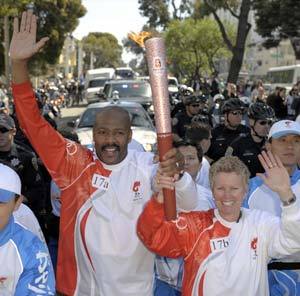 | | Torchbearers Robert McDaniels(l) and Cindy Stinger carry the torch. |
 | | Students of the Saint Brigid School cheer for the Olympic flame. |
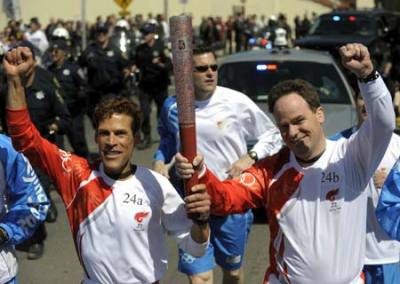 | | Torchbearers Dean Karnazes and Max Cobb carry the torch. |
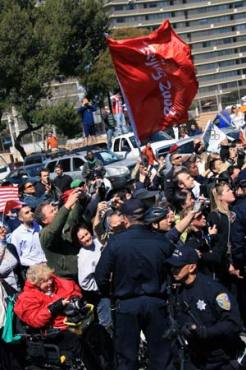 | | Spectators strain to glimpse the Olympic flame after the planned route was shortened and changed several times. |
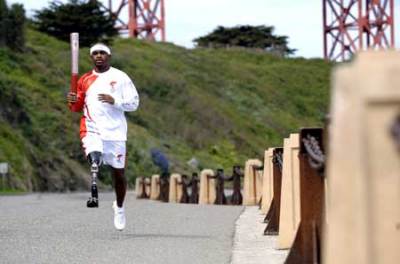 | | A handicapped torchbearer carries the torch below the Golden Gate Bridge, San Francisco. |
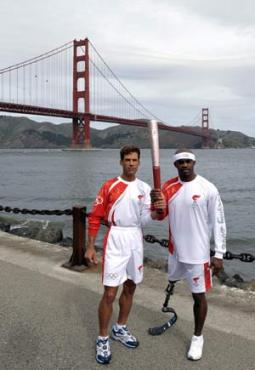 | | Torchbearers pose with the torch in front of the Golden Gate Bridge, San Francisco. |
 | | Torchbearers carry the torch in front of the Golden Gate Bridge, San Francisco. |
 | | A torchbearer carries the torch in front of the Golden Gate Bridge, San Francisco. |
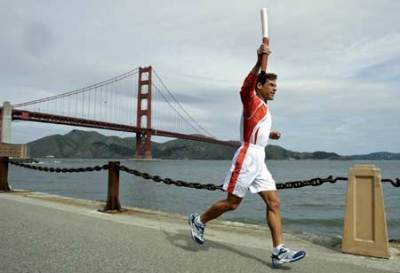 | | A torchbearer carries the torch in front of the Golden Gate Bridge, San Francisco. |
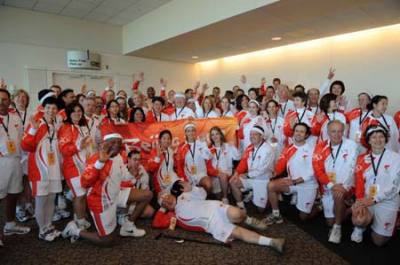 | | Some torchbearers pose for a group photo at the San Francisco torch relay closing ceremony. The ceremony was held at the airport in San Francisco instead of the Justin Herman Plaza as scheduled due to pro-Tibet protestors. |
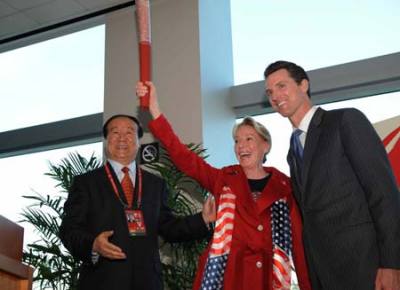 | | Jiang Xiaoyu(l), the executive vice president of the Beijing Organizing Committee for the 2008 Olympic Games, presents an Olympic torch to San Francisco Mayor Gavin Newsom(r) and Protocol Charlotte Millard Shultz at the torch relay closing ceremony. |
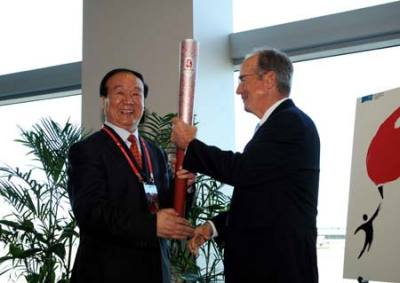 | | Jiang Xiaoyu(l) presents an Olympic torch to the US Olympic Committee Chairman Peter Ueberroth at the torch relay closing ceremony. |
 | | San Francisco Mayor Gavin Newsom(l) presents a gift to Jiang Xiaoyuat at the torch relay closing ceremony. |
 | | Chinese Ambassador to the United States Zhou Wenzhong(r) speaks at the torch relay closing ceremony. |
|
7th leg of the Torch Relay- Buenos Aires, Argentina. 11 April 2008
The torch relay leg in Buenos Aires began with an artistic show at the Lola Mora amphitheatre in Costanera Sur. In the end of the show the mayor of Buenos Aires Mauricio Macri gave the torch to the first torchbearer, Carlos Espínola. The leg finished at the Buenos Aires Riding Club in the Palermo district, the last torchbearer being Gabriela Sabatini. The 13.8 km route included landmarks like the obelisk and Plaza de Mayo. Among the remaining 78 torchbearers were famous athletes like Georgina Bardach, Paola Suárez and Pablo Chacón.
Soccer star Diego Maradona was among the athletes invited to carry the torch, but he delayed his stay overseas in an apparent attempt to avoid the Olympic controversy. The day was marked by several pro-Tibet protests, which included a giant banner reading "Free Tibet", and an alternative "human rights torch" that was lit by protesters and paraded along the route the flame was to take. Most of these protests were peaceful in nature, and the torch was not impeded. Chinese immigrants also turned out in support of the Games, but only minor scuffles were reported between both groups. Runners surrounded by rows of security carried the Olympic flame past thousands of jubilant Argentines in the most trouble-free torch relay in nearly a week. People showered the parade route with confetti as banks, government offices and businesses took an impromptu half-day holiday for the only Latin American stop on the flame's five-continent journey.




 |



 |



 |



 |
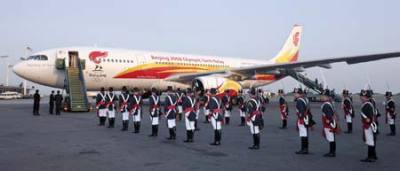 | | An honor guard stands before the special plane which carries the Olympic flame at the Ezeiza international airport, on the outskirts of Buenos Aires. |
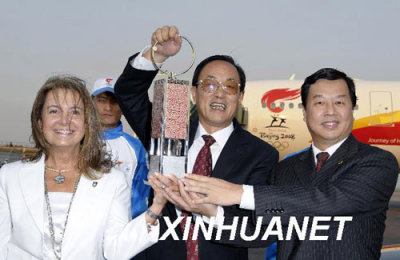 | | Liu Jingmin shows the lantern which holds the Olympic flame with Chinese Ambassador to Argentina Zeng Gang(r) and Argentine Olympic Committee (COA) vice president Alicia Masoni de Morea at the Ezeiza international airport. |
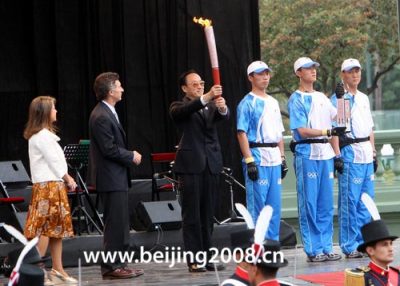 | | Liu Jingmin, executive vice president of BOCOG, holding the torch and showing it to the crowds. |
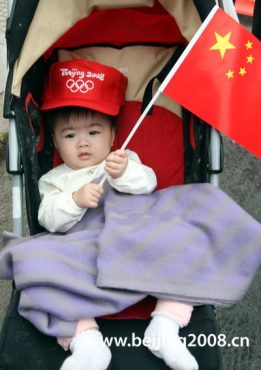 | | A Chinese baby waves the national flag of China among the welcoming crowd at Ezeiza International Airport. |
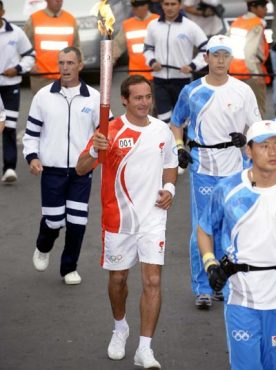 | | Torchbearer Carlos Espinola carries the torch. |
 | | Spectators wait for the torch relay. |
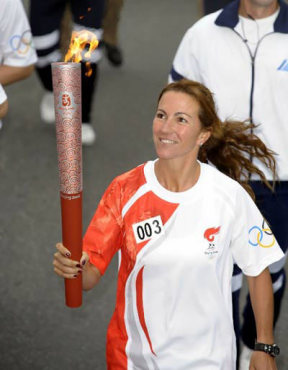 | | Third torchbearer carries the torch. |
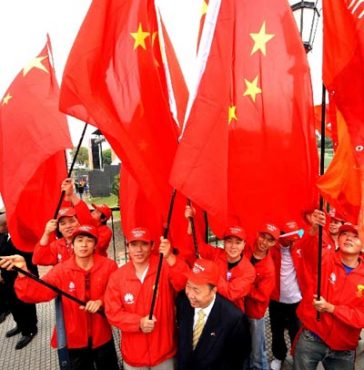 | | Spectators wait for the torch relay. |
 | | A torchbearer carrying the torch by boat during the torch relay. |
 | | Chinese torchbearer Zhang Hao carries the torch. |
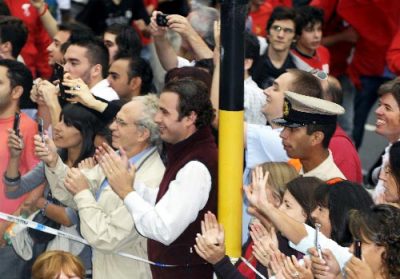 | | Spectators wait for the torch relay. |
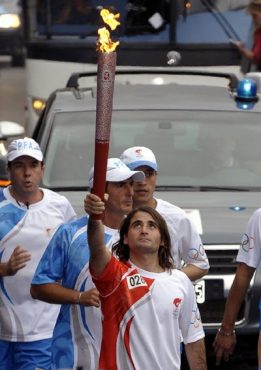 | | Torchbearer Javier Conte carries the torch. |
 | | Spectators wait for the torch relay. |
 | | Torchbearer Vanina Sanchez Veron carries the torch. |
 | | The second torchbearer carries the torch. |
 | | The last torchbearer, Gabriela Sabatini, kindles the relay cauldron. |
 | | Liu Jingmin, shaking hands with mayor of Buenos Aires at the torch relay closing ceremony. |
|
8th leg of the Torch Relay- Dar es Salaam, Tanzania. 13 April 2008
The relay covered 5 km. The torch was lit by Vice-President Ali Mohamed Shein, and torchbearers included John Stephen Akhwari, Dorcus Inzikuru and Anna Tibaijuka. About a thousand people followed the relay, waving the Olympic flag. The only noted instance of protest was Nobel Peace Prize laureate Wangari Maathai's withdrawal from the list of torchbearers, in protest against human rights abuses in Tibet.




 |




 |




 |




 |
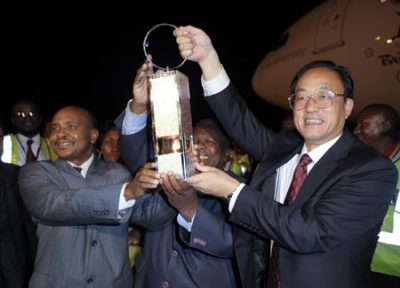 | | Liu Jingmin(r), the executive vice president of the Beijing Organizing Committee for the 2008 Olympic Games (BOCOG), shows the lantern which holds the Olympic flame with the Tanzanian Minister of Information, Culture and Sports Geoge Mkuchika(c) and Dar es Salaam City Mayor Adam Kimbisa at the airport in Dar es Salaam. |
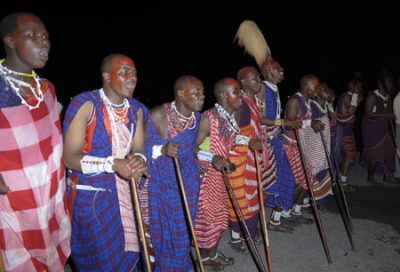 | | Folk performance is held to welcome the Beijing Olympic flame at the airport in Dar es Salaam. |
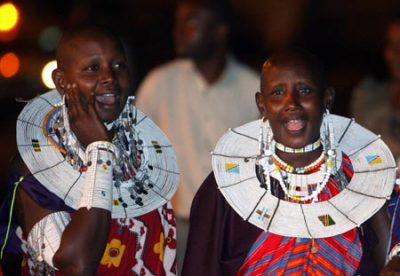 | | Folk performance is held to welcome the Beijing Olympic flame at the airport in Dar es Salaam. |
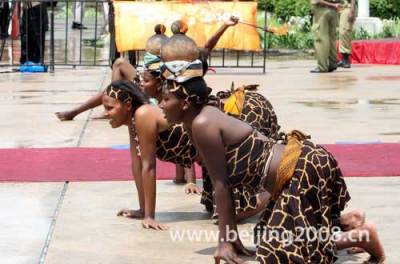 | | Folk performance is held to welcome the Beijing Olympic flame at the airport in Dar es Salaam. |
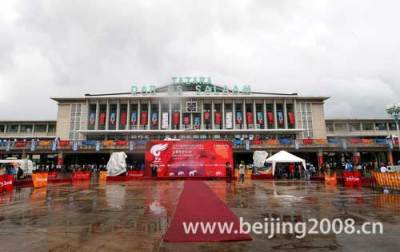 | | Site of set-off ceremony for the Olympic torch relay. |
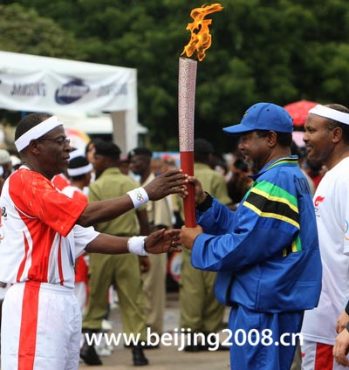 | | Vice President of Tanzania, Ali Mohamed Shein, hands over the Olympic flame to the first torchbearer, Tanzanian Minister of State for Union Affairs, Mohamed Seif Khatib. |
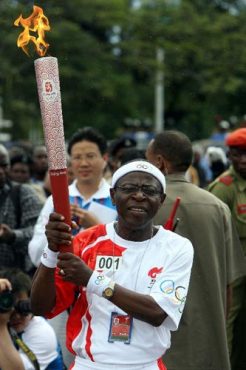 | | First torchbearer Tanzanian Minister of State for Union Affairs, Mohamed Seif Khatib. |
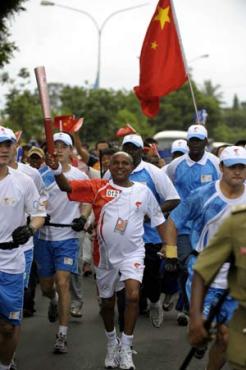 | | Torchbearer John S. Akhwari carries the torch. |
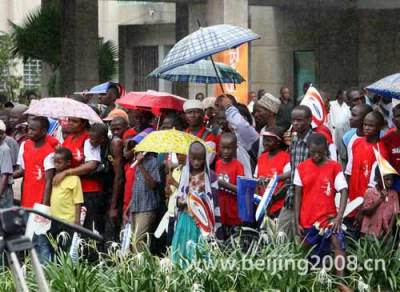 | | Spectators wait for the torch relay. |
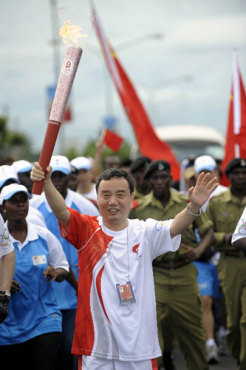 | | Torchbearer Liu Xinsheng, Chinese Ambassador to Tanzania, carries the torch. |
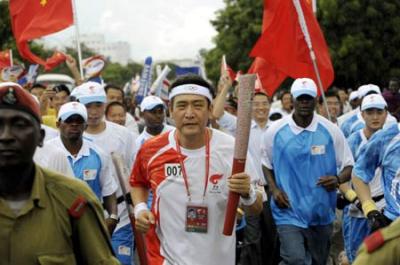 | | Torchbearer Gen. Lansana Palenfo carries the torch. |
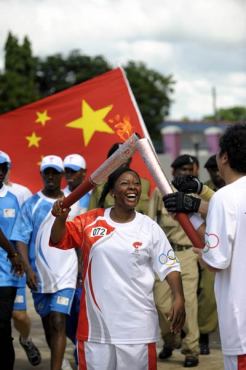 | | The flame is passed on to another torchbearer during the torch relay. |
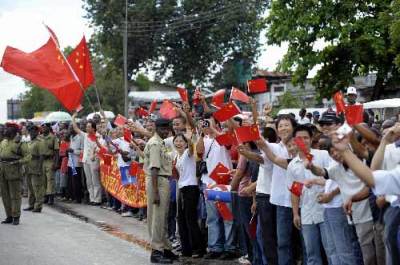 | | Spectators wait for the torch relay. |
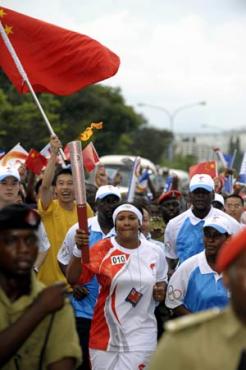 | | Torchbearer Lina M. Mhando carries the torch. |
 | | Torchbearer Jiang Senlin carries the torch. |
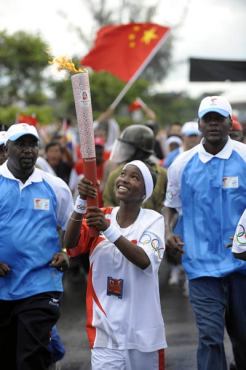 | | Mustapha F. Damiri, an HIV carrier, runs with the Olympic flame. |
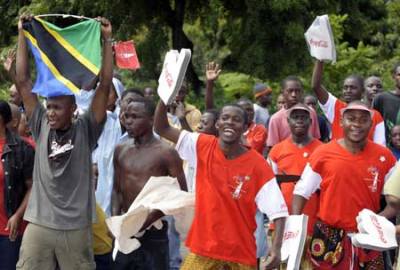 | | Spectators wait for the torch relay. |
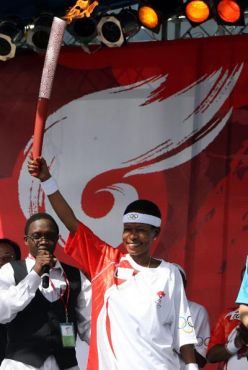 | | Anna Tibaijuka, UN Under-Secretary-General and UN-HABITAT Executive Director, brought the flame to the Tanzanian National Stadium for the torch relay closing ceremony. |
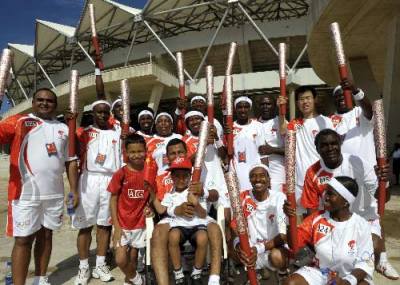 | | Dar es Salaam Torchbearers pose together at the torch relay closing ceremony. |
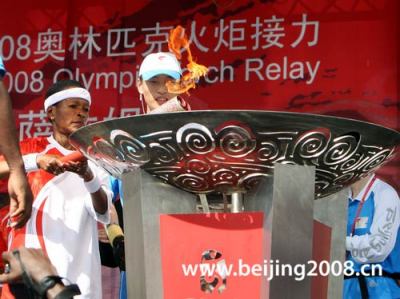 | | Anna Tibaijuka, UN Under-Secretary-General and UN-HABITAT Executive Director, kindles the torch relay culdron at the torch relay closing ceremony. |
|
9th leg of the Torch Relay- Muscat, Oman. 14 April 2008
The relay covered 20 km. Among the torchbearers was Rahma Marhoon, who will represent Oman at the Beijing Paralympic Games. It was the first time that Oman hosted the Olympic torch relay. No protests or incidents were reported.




 |




 |




 |





 |
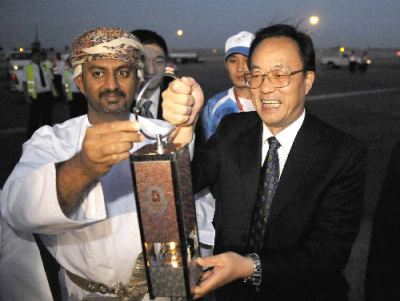 | | Liu Jingmin(r), executive vice president of the Beijing Organizing Committee for the 2008 Olympic Games (BOCOG), holds the lantern carrying the Olympic flame with Omani Minister of Sports Affairs and Chairman of the Oman Olympic Committee (OOC), Ali bin Masoud Al Sunaidy(l). |
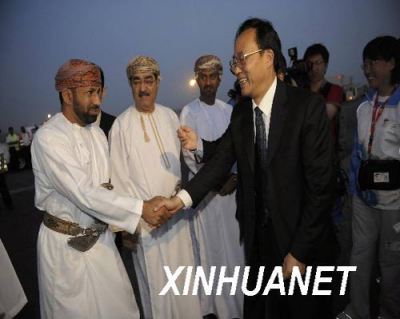 | | Liu Jingmin shakes hands with representives from Oman. |
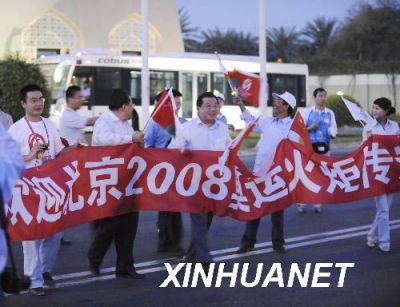 | | Spectators gather to welcome the torch relay. |
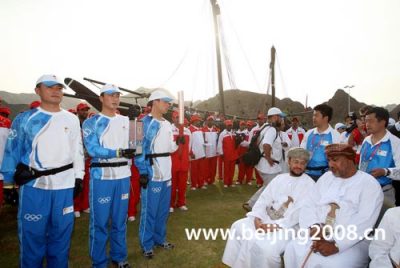 | | The relay kicked off at 1300 GMT at Al Bustan roundabout in the eastern part of the coastal city, where lies the duplicate of an ancient Omani wooden ship that sailed to China more than 1,000 years ago. |
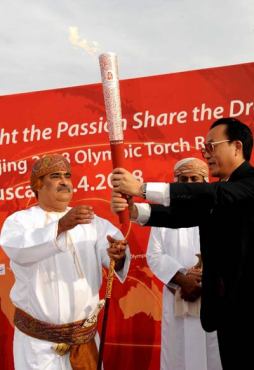 | | Liu Jingmin hands over the Olympic torch to Sayyid Al Mutassim bin Hamoud Al Bousaidi, minister of state and governor of Muscat, during the set-off ceremony. |
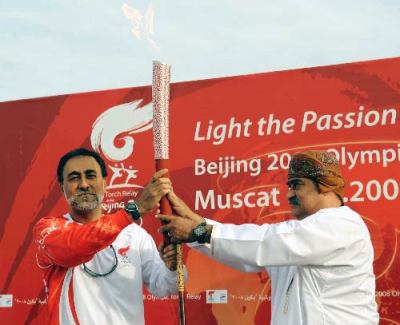 | | Sayyid Al Mutassim bin Hamoud Al Bousaidi hands over to the first torchbearer, Sayyid Shihab bin Tareq al Said. |
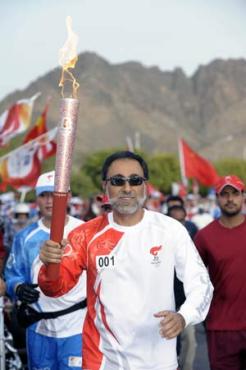 | | The first torchbearer, Sayyid Shihab bin Tareq al Said, carries the torch. |
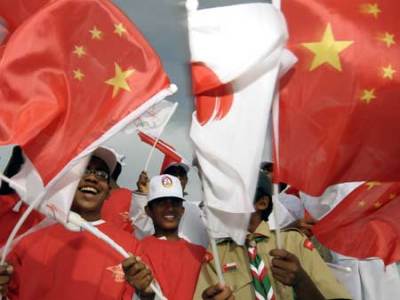 | | Spectators wait for the torch relay. |
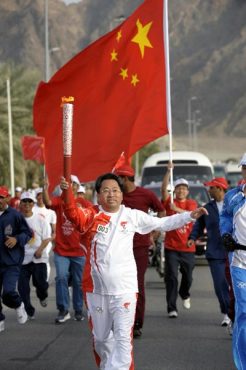 | | Torchbearer Sheng Yuming carries the torch. |
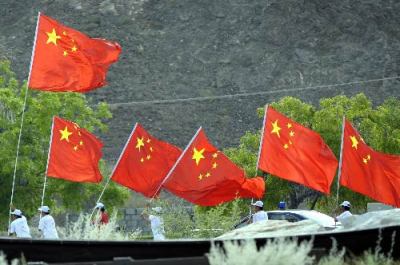 | | Spectators wait for the torch relay. |
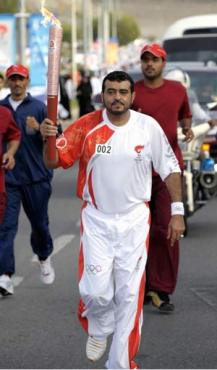 | | Torchbearer Fatik Bin Fahar Al Sayyid carries the torch. |
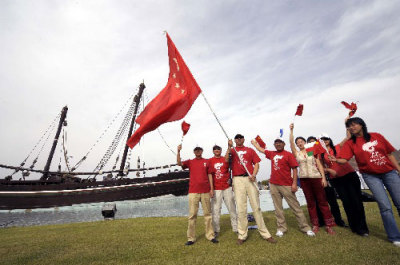 | | Spectators wait for the torch relay. |
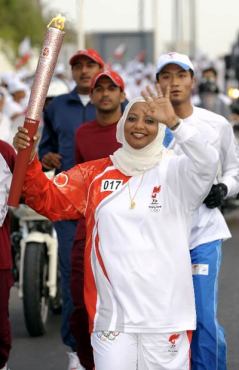 | | The first woman torchbear carries the torch. |
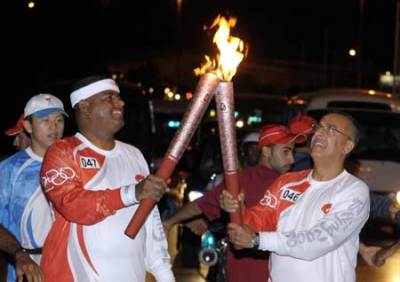 | | Torchbearer Moosa Mohamed(r) lights the torch for the next torchbearer Ahmed Darwish Al Balushi during the torch relay. |
 | | Spectators wait for the torch relay. |
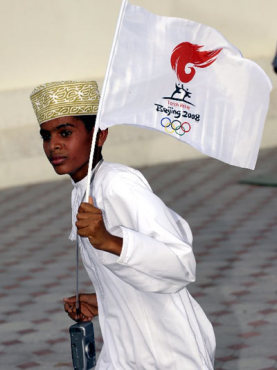 | | An Omani child watches as the torch relay passes. |
 | | Chinese torchbearer Wu Peijuan carries the torch. |
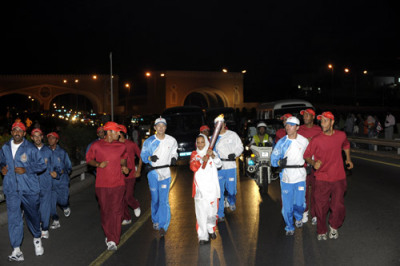 | | A torchbearer carries the torch. |
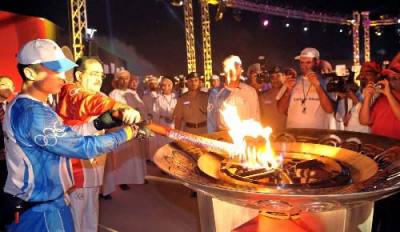 | | Vice president of Oman Olympic Committee kindles the torch relay culdron. |
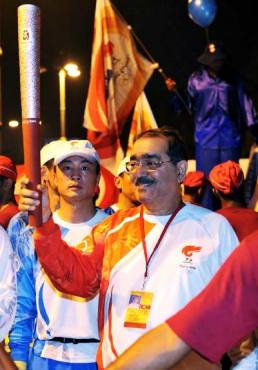 | | Vice president of Oman Olympic Committee showing the torch to the crowds. |
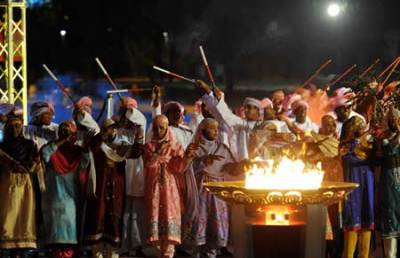 | | Artists cheer during the torch relay closing ceremony. |
|
10th leg of the Torch Relay- Islamabad, Pakistan. 16 April 2008
President Pervez Musharraf and Prime Minister Yousaf Raza Gillani spoke at the opening ceremony of the relay. The first torchbearer was Samiullah Khan, and the last was Jahangir Khan. Security was high, for what one newspaper called the "most sensitive leg" of the torch's Olympic journey. The relay was initially supposed to carry the torch around Islamabad, but the entire relay was cancelled due to security concerns regarding "militant threats or anti-China protests", and replaced by an indoors ceremony with the torch carried around the track of Jinnah Stadium.



 |



 |



 |



 |
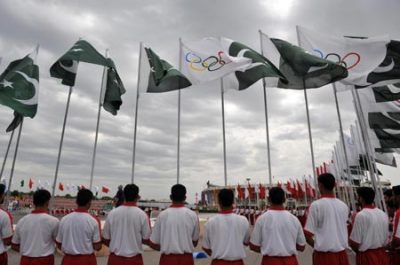 | | Middle school students perform at the torch relay ceremony in Jinnah Sports Complex, around which the Olympic flame will be carried. |
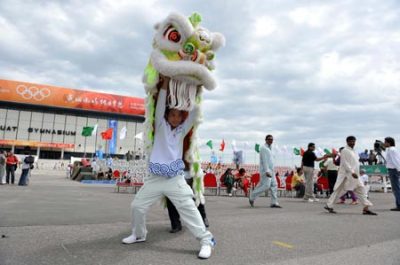 | | Torchbearer Lu Yupeng plays lion dancing in Jinnah Sports Complex, Islamabad. |
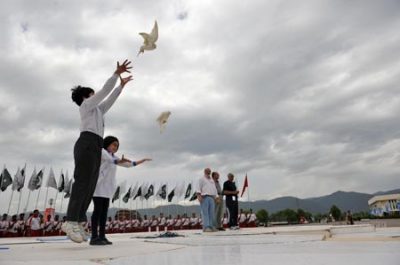 | | Two children free pigeons during the torch relay ceremony in Jinnah Sports Complex, Islamabad. |
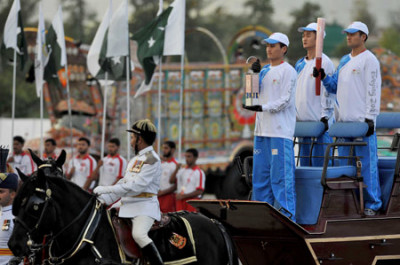 | | Flame guards escort the torch and a lantern which holds the Olympic flame to the venue of the lighting ceremony of the Olympic torch relay at the Pakistan Sports Complex, Islamabad. |
 | | Jiang Xiaoyu(r), vice president of the Beijing Organizing Committee of Olympic Games, presents the torch to Pakistani President Pervez Musharraf(l) and Prime Minister Yousuf Raza Gillani at the lighting ceremony of the Olympic torch relay at the Pakistan Sports Complex, Islamabad. |
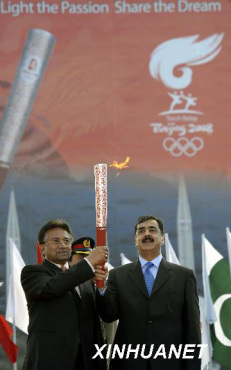 | | Pakistani President Pervez Musharraf(l) and Prime Minister Yousuf Raza Gillani(r) hold the torch at the lighting ceremony of the Olympic torch relay at the Pakistan Sports Complex, Islamabad. |
 | | Pakistani President Pervez Musharraf and Prime Minister Yousuf Raza Gillani(r) present the torch to the first torchbearer Samiullah Khan at the Pakistan Sports Complex, Islamabad. |
 | | Spectators observe the torch relay at the Pakistan Sports Complex, Islamabad. |
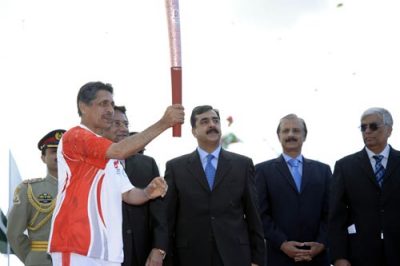 | | The first torchbearer, Samiullah Khan(l), was part of the bronze medal winning field hockey team at the 1976 Olympic Games. |
 | | Spectators observe the torch relay at the Pakistan Sports Complex, Islamabad. |
 | | Torchbearer Raheela Bano carries the torch around the Pakistan Sports Complex, Islamabad. |
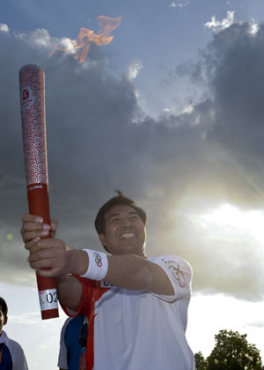 | | Torchbearer Luo Zhaohui, Chinese Ambassador to Pakistan carries the torch around the Pakistan Sports Complex, Islamabad. |
 | | Chinese national flags, Pakistani national flags, Olympic flags, and 2008 Beijing torch relay flags are paraded into the stadium by Pakistani youth. |
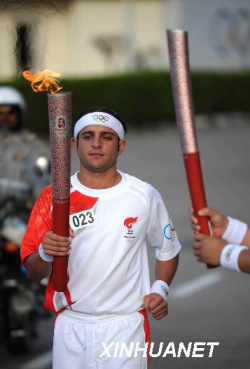 | | A torchbearer prepares to hand off the Olympic flame to the next runner. |
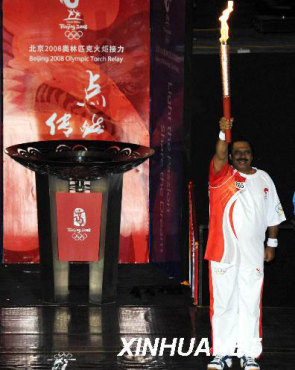 | | Jahangir Khan shows the Olympic torch before lighting the torch relay cauldron. |
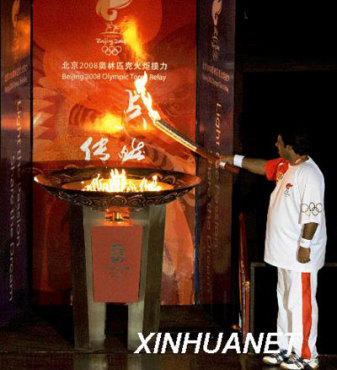 | | Jahangir Khan, the last torchbearer, lights the torch relay cauldron. |
|
11th leg of the Torch Relay- New Delhi, India. 17 April 2008
Due to concerns about pro-Tibet protests, the relay through New Delhi was cut to just 2.3 km (less than 1.5 miles), which was shared amongst 70 runners. It concluded at the India Gate. The event was peaceful due to the public not being allowed at the relay. A total of five intended torchbearers -Kiran Bedi, Soha Ali Khan, Sachin Tendulkar, Bhaichung Bhutia and Sunil Gavaskar- withdrew from the event, citing "personal reasons", or, in Bhutia's case, explicitly wishing to "stand by the people of Tibet and their struggle" and protest against the PRC "crackdown" in Tibet. Torchbearers who did participate included Manavjit Singh Sandhu, Abhinav Bindra, Ayan Ali Bangash and Rajinder Singh Rahelu.


 |

 |

 |

 |
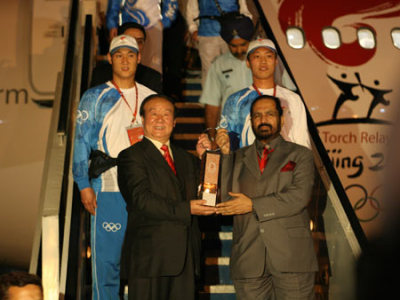 | | Jiang Xiaoyu(l), BOCOG executive vice-president, displays the Olympic flame together with Indian Olympic Association President, Suresh Kalmadi(r). |
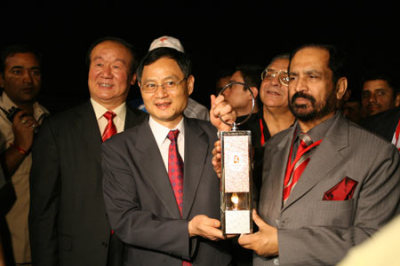 | | Chinese Embassador to India, Zhang Yan(l), displays the lantern which holds the Olympic flame together with Indian Olympic Association president, Suresh Kalmadi(r). |
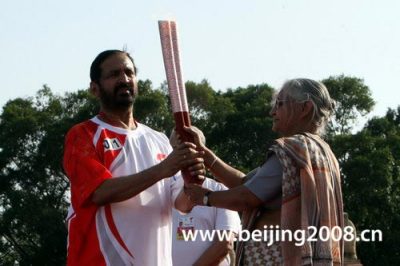 | | The Olympic torch is handed over to the first torchbearer(l). |
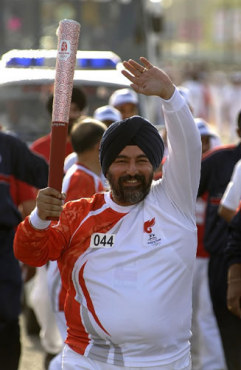 | | A torchbearer carries the torch. |
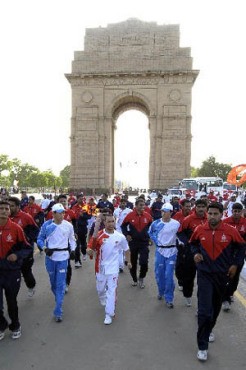 | | Torchbearer Amir Khan carries the torch. |
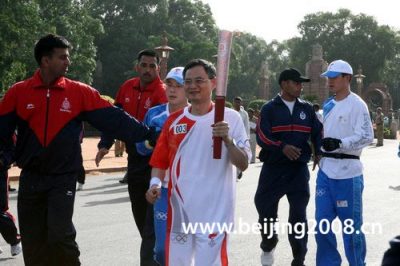 | | Chinese Ambassador to India, Zhang Yan, the third torchbearer, carries the torch. |
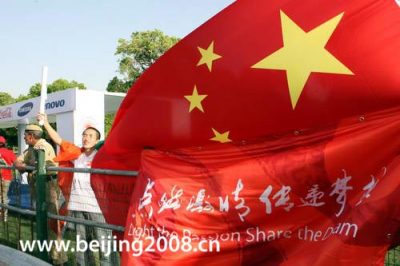 | | Spectators wait for the torch relay. |
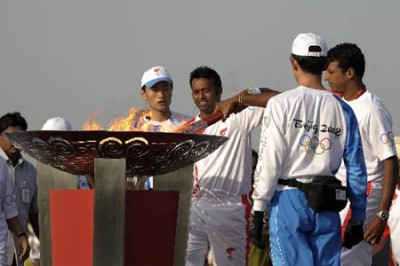 | | The torch relay culdron is lit at the end of the New Delhi, India torch relay. |
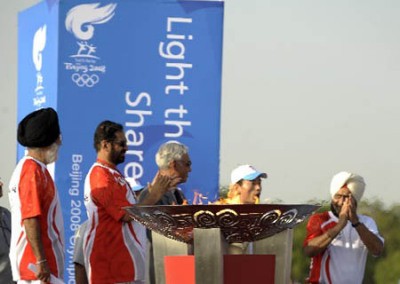 | | The torch relay culdron is lit at the end of the New Delhi, India torch relay. |
|
12th leg of the Torch Relay- Bankok, Thailand. 18 April 2008
The relay covered just over 10 km, and included Bangkok's Chinatown. The torch was carried past Democracy Monument, Chitralada Palace and a number of other city landmarks. Among the torchbearers were Deputy Prime Minister Sanan Kajornprasart, followed by Thailand's five Olympic champions, Manus Boonjumnong, Somluck Kamsing, Udomporn Polsak, Vijan Polnlid and Pawina Thongsuk. M.R. Narisa Chakrabongse, Green World Foundation (GWF) chairwoman, withdrew from the torch-running ceremony, protesting against China's actions in Tibet. Several hundred protesters were present, along with Olympic supporters.


 |


 |


 |


 |
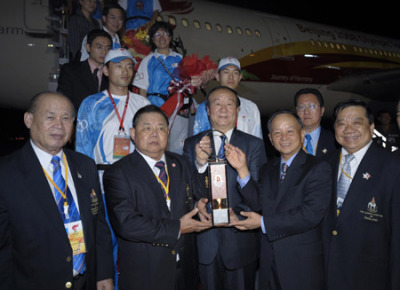 | | Jiang Xiaoyu(c), executive vice president of the Beijing Organizing Committee for the 2008 Olympic Games (BOCOG), General Yuthasak Sasiprapha (2nd l), President of National Olympic Committee of Thailand (NOCT), and Chinese Ambassador to Thailand, Zhang Jiuhuan, (2nd r) display the lantern which holds the Olympic flame. |
 | | The China Gate at Bangkok's China Town, start of the torch relay. |
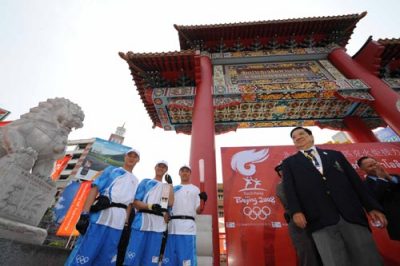 | | Three escort runners protect the Olympic flame at the start of the torch relay, in front of Bangkok's China Gate. |
 | | Spectators wait for the torch relay. |
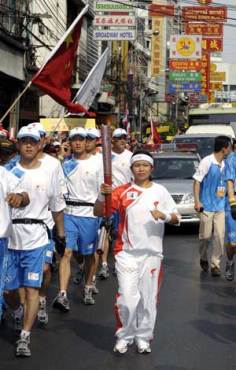 | | Torchbearer Yanint Raso carries the torch. |
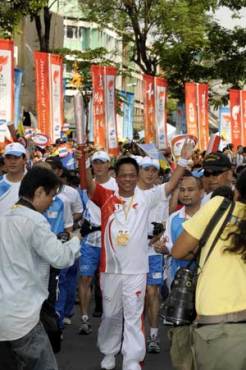 | | The first torchbearer, Anant Siripasraporn, Deputy Permanent Secretary for Bangkok Metropolitan Administration, carries the torch. |
 | | Torchbearer Wlchal Surlyut carries the torch. |
 | | A torchbearer carries the torch. |
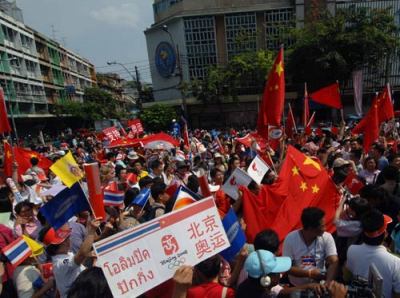 | | Spectators wait for the torch relay. |
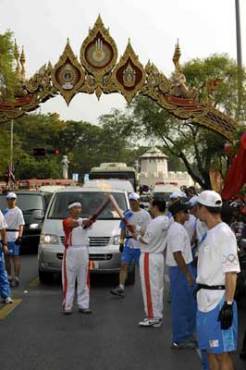 | | A torchbearer takes the Olympic flame from another torchbearer during the torch relay. |
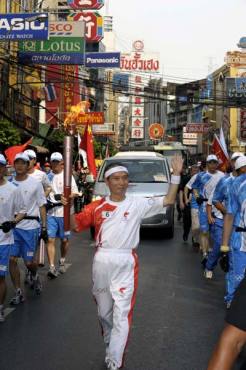 | | A torchbearer carries the torch. |
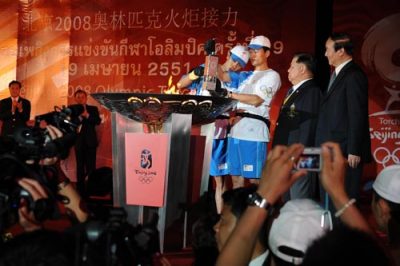 | | The torch relay safety lantern is rekindled from the culdron at the end of the torch relay, in order to ensure the eternity of the flame lasts between relay route stops. The flame has remained lit from the time of the initial lighting in Olympia, Greece on 30 March 2008 and will remain lit until the end of the XXIX Olympiad in Beijing on 24 August 2008. |
|
13th leg of the Torch Relay- Kuala Lumpur, Malaysia. 21 April 2008
The 16.5 km long-relay began from the historic Independence Square, passed in front of several city landmarks before coming to an end at the iconic Petronas Twin Towers. Among the landmarks the Olympic flame passed next to were the Parliament House, National Mosque, KL Tower and Merdeka Stadium. A team of 1000 personnel from the Malaysian police Special Action Squad guarded the event and escorted the torchbearers. There were a total of 80 torchbearers, comprising corporate figures, sports personalities and patrons of sports organizations. Cheah Soon Kit, Yap Kim Hock and Nicol David were among the torchbearers. The last time an Olympic torch relay was held in Malaysia was before the 1964 Tokyo Olympics.






 |






 |






 |






 |
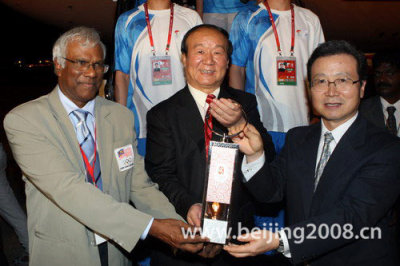 | | The sacred flame of the 2008 Beijing Olympic Games on early Sunday arrived in the Malaysia capital of Kuala Lumpur. |
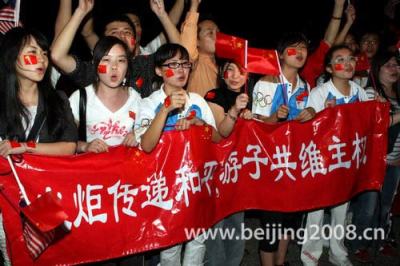 | | Overseas Chinese in Malaysia welcomes the flame at the airport. |
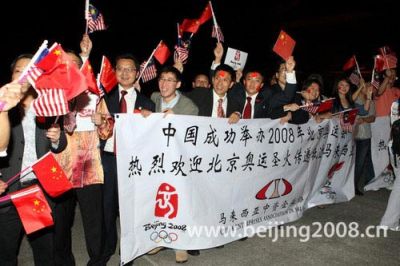 | | Overseas Chinese in Malaysia welcomes the flame at the airport. |
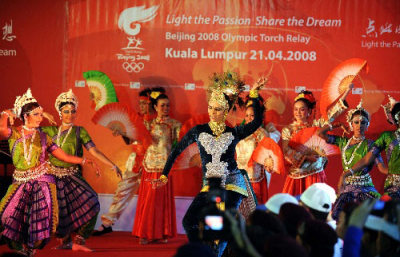 | | Folk art dance performance. |
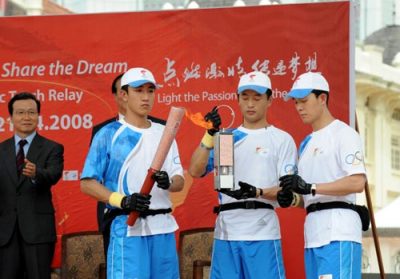 | | Flame guards kindle the first torch from the torch relay lantern. |
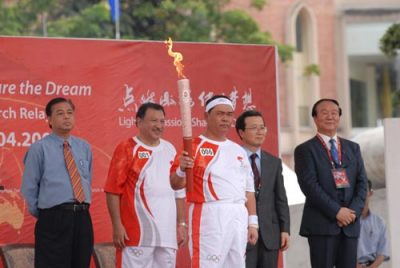 | | The 6th torchbearer, Kuala Lumpur Mayor, Abdul Hakim Borhan, holds the Olympic torch ahead of the torch relay. |
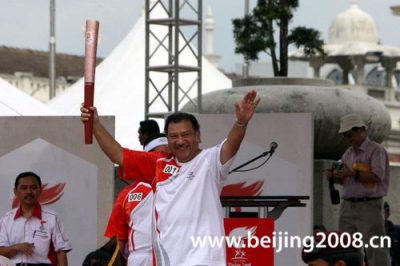 | | Malaysia's first torchbearer, OCM president Tunku Tan Sri Imran Tuanku Ja'afar, holds the Beijing Olympic torch. |
 | | The 10th torchbearer Shaharuddin Jaafar carries the torch. |
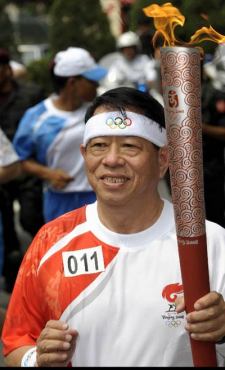 | | The 11th torchbearer Teng Mui Ngee carries the torch. |
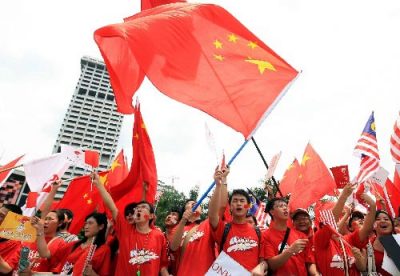 | | Spectators wait for the torch relay. |
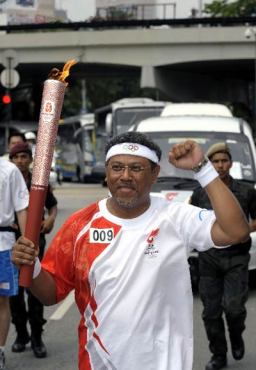 | | The 9th torchbearer Ramlan Abd Aziz carries the torch. |
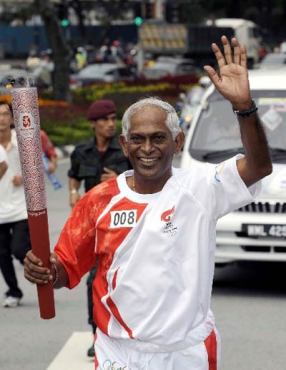 | | The 8th torchbearer Karu Selvaratnam carries the torch. |
 | | The 7th torchbearer Mohd Yasin Mohd Salleh carries the torch. |
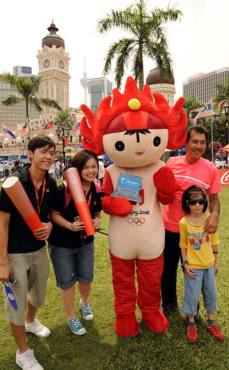 | | Local residents pose with one of Fuwa, the official mascots of the Beijing Olympic Games, during the torch relay. |
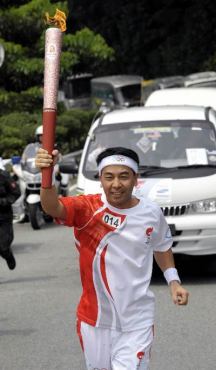 | | Shi Fangfan, the 14th torchbearer, carries the torch. |
 | | Torchbearer Puan Soon Lay Im carries the torch. |
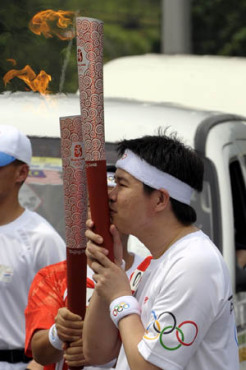 | | Cheah Soon Kit kisses the torch during the torch relay. |
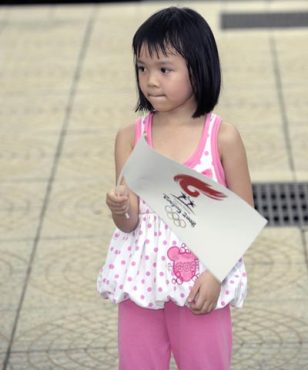 | | A Malaysian girl holds a flag as she awaits the torch relay. |
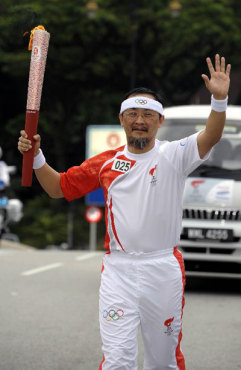 | | A torch bearer carries the torch. |
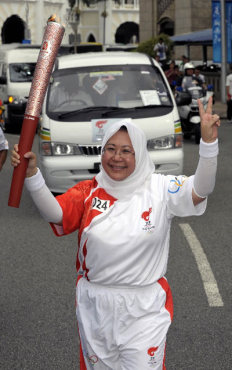 | | A torch bearer carries the torch. |
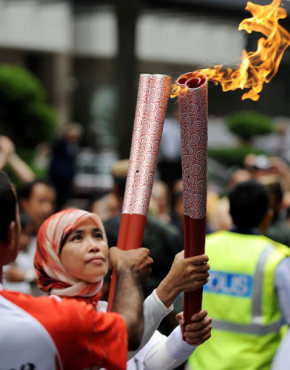 | | Torchbearers relay the Olymic flame during the torch relay. |
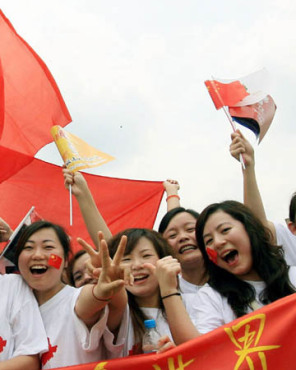 | | Spectators watch the torch relay. |
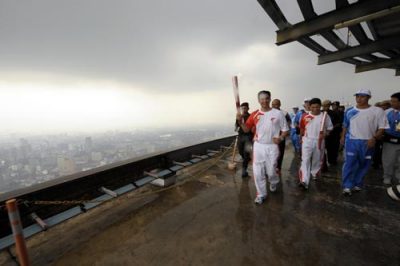 | | The 61st torchbearer runs with Olympic torch atop Kuala Lumpur's TV Tower. |
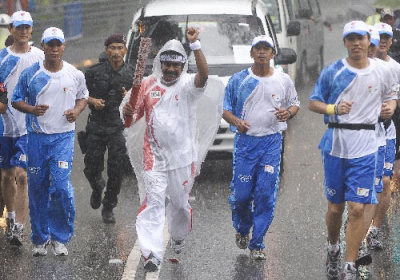 | | A torchbearer runs with the Olympic torch amid heavy rain. |
 | | Chinese ambassador to Malaysia Cheng Yonghua carries the flame. |
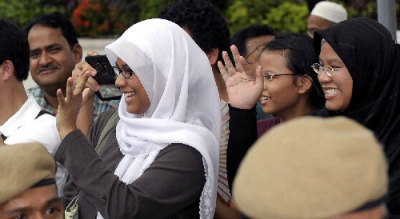 | | Spectators watch the torch relay. |
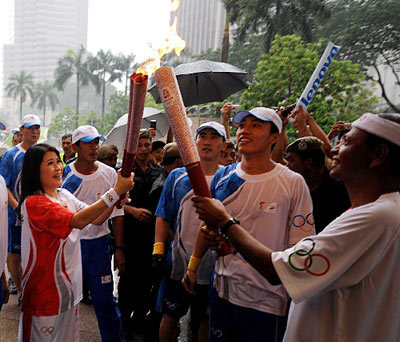 | | Chinese Ambassador to Malaysia Cheng Yonghua kindles the Olympic torch for the last torchbearer during the torch relay. |
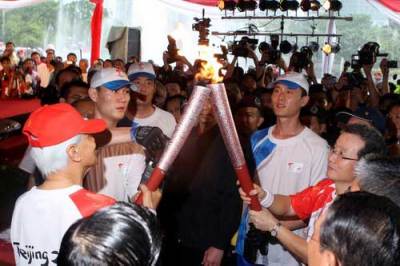 | | Chinese Ambassador to Malaysia Cheng Yonghua kindles the Olympic torch for the last torchbearer during the torch relay. |
|
14th leg of the Torch Relay- Jakarta, Indonesia. 22 April 2008
Among the torchbearers were athletes Taufik Hidayat, Susi Susanti and Alan Budikusuma and the governor of Jakarta, Fauzi Bowo. The original 20 km relay through Jakarta was cancelled due to "security worries", at the request of the Chinese embassy, and the torch was instead carried round the city main's stadium, as it had been in Islamabad. Several dozen pro-Tibet protesters gathered near the stadium, and were dispersed by the police.




 |




 |




 |



 |
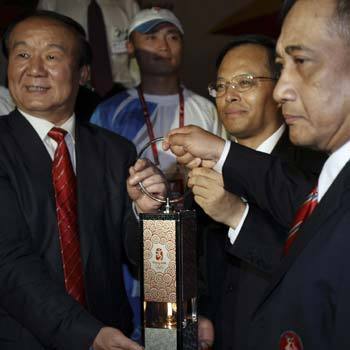 | | The flame of the 2008 Beijing Olympic Games arrives in the Indonesian capital of Jakarta. |
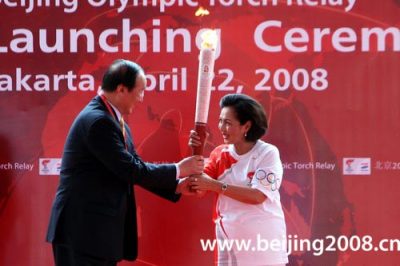 | | Jiang Xiaoyu(l), executive vice president of the Beijing Organizing Committee of Olympic Games (BOCOG), hands over the torch to Rita Subowo, president of the National Olympic Committee of Indonesia. |
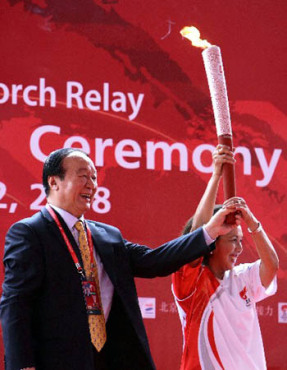 | | Jiang Xiaoyu(l), executive vice president of the Beijing Organizing Committee of Olympic Games (BOCOG), shows the torch with Rita Subowo, president of the National Olympic Committee of Indonesia. |
 | | Rita Subowo(l), president of the National Olympic Committee of Indonesia, passes on the torch to Jakarta Governor Fauzi Bowo, the first torchbearer. |
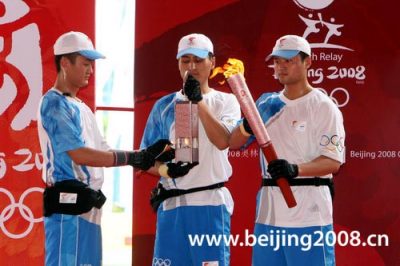 | | The flame escorts kindle the Olympic torch from the flame lantern. |
 | | Young women dance to greet the sacred flame during the torch relay. |
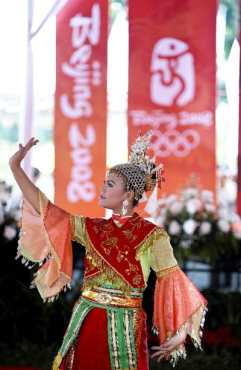 | | A young woman dances to greet the sacred flame during the torch relay. |
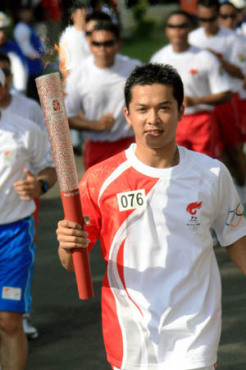 | | Torchbearer Taufik Hidayat carries the torch. |
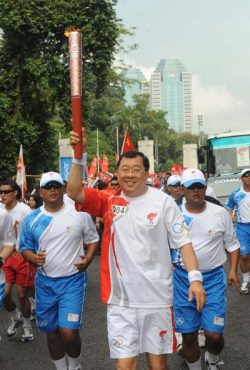 | | The 4th torchbearer, Abdul Alex Soelistyo carries the torch. |
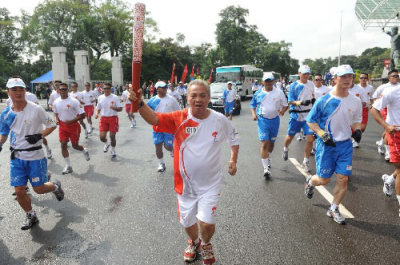 | | A torchbearer carries the torch. |
 | | Spectators watch the torch relay. |
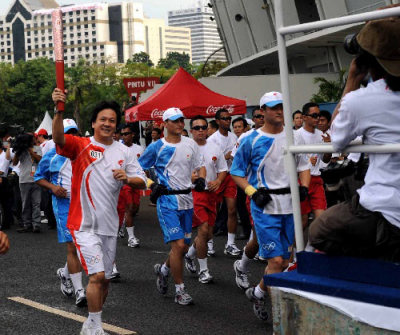 | | Indonesia's former badminton player Liem Swie King carries the torch. |
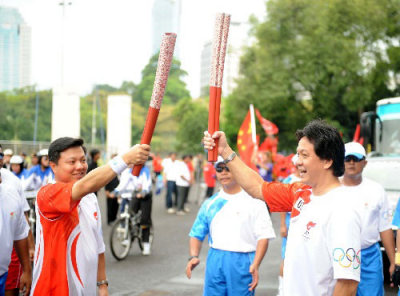 | | Two torchbearers relay the Olympic flame during the torch relay. |
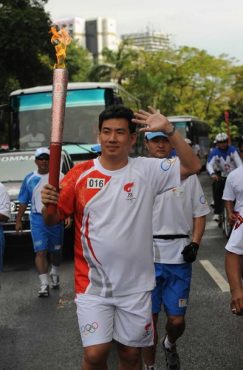 | | Indonesian badminton player Alan Budi Kusuma carries the torch. |
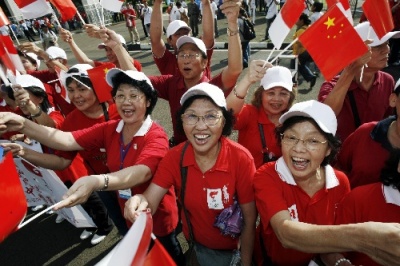 | | Spectators watch the torch relay. |
 | | Susi Susanti, former Olympic badminton champion carries the torch. |
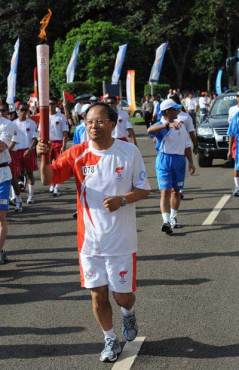 | | Torchbearer Lan Lijun, Chinese ambassador to Indonesia carries the torch. |
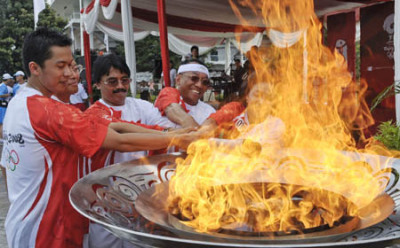 | | Five torchbearers light the cauldron together during the torch relay closing ceremony. |
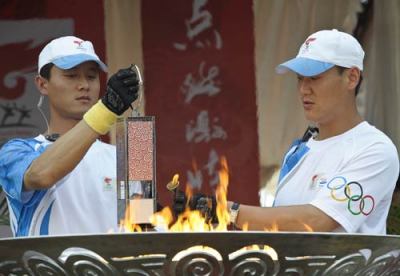 | | The torch relay safety lantern is rekindled from the culdron at the end of the torch relay, in order to ensure the eternity of the flame lasts between relay route stops. The flame has remained lit from the time of the initial lighting in Olympia, Greece on 30 March 2008 and will remain lit until the end of the XXIX Olympiad in Beijing on 24 August 2008. |
|
15th leg of the Torch Relay- Canberra, Australia. 24 April 2008
The relay covered around 16 km of Canberra's central areas, from Reconciliation Place to Commonwealth Park. Upon its arrival in Canberra, the Olympic flame was presented by Chinese officials to local Aboriginal elder Agnes Shea, of the Ngunnawal people. She, in turn, offered them a message stick, as a gift of peace and welcome. Among the torchbearers were Ian Thorpe, Ron Clarke, Jodie Henry, Tania Major, Megan Marcks, Jonathon Welch, Libby Trickett, Robert de Castella, Matt Welsh, Adam Pine, Lee Kernaghan, Alice Mills, Fiona Stanley, Mark Beretta, Peter Sharp, Louise Sauvage, Jai Taurima, Petria Thomas, Fiona Wood and Heather McKay. One torchbearer, Lin Hatfield Dodds, withdrew from the event, citing concerns about China's human rights record. Hundreds of pro-Tibet protesters and thousands of Chinese students reportedly attended. Demonstrators and counter-demonstrators were kept apart by the Australian Federal Police. Preparations for the event were marred by a disagreement over the role of the Chinese flame attendants, with Australian and Chinese officials arguing publicly over their function and prerogatives during a press conference.




 |




 |




 |




 |
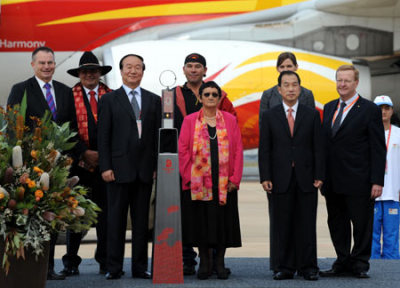 | | Jiang Xiaoyu(3rd l), executive vice president of the Beijing Organizing Committee for the 2008 Olympic Games (BOCOG), Chinese ambassador Zhang Junsai, and the welcoming officials pose with the lantern which holds the Olympic flame at the airport in Canberra. Australian Capital Territory (ACT) Chief Minister Jon Stanhope, Sports Minister Kate Ellis, President of the Australian Olympic Committee John Coates, ambassador Zhang Junsai and Indigenous elder Agnes Shea of the Ngunnawal people were at the airport to meet the sacred flame. |
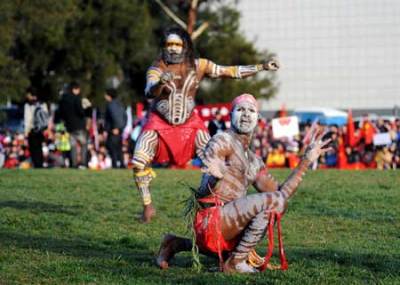 | | Aboriginals perform ahead of the torch relay. |
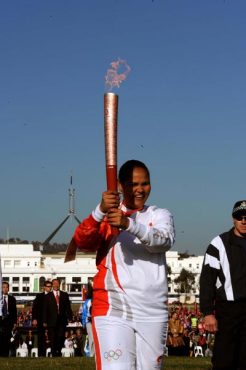 | | First torchbearer Tania Major carries the torch. |
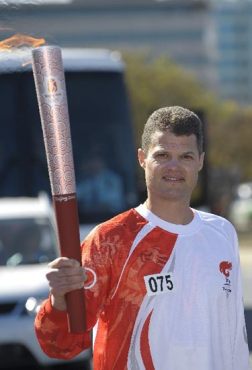 | | A torchbearer carries the torch. |
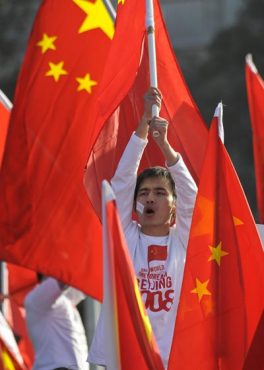 | | Spectators watch the torch relay. |
 | | A torchbearer carries the torch. |
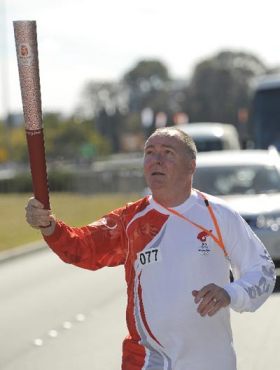 | | A torchbearer carries the torch. |
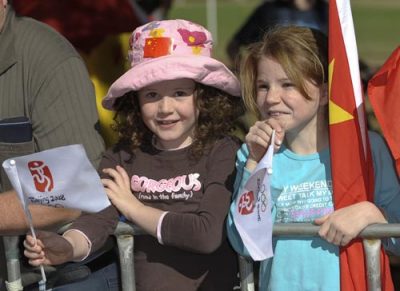 | | Spectators watch the torch relay. |
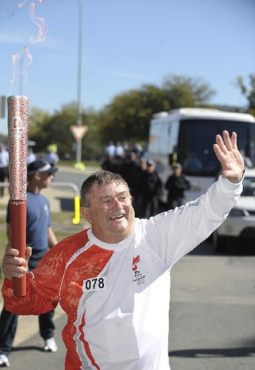 | | A torchbearer carries the torch. |
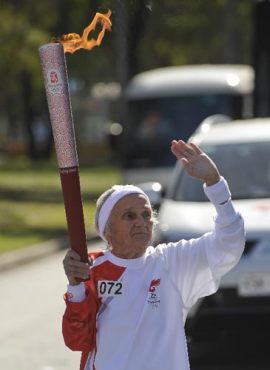 | | A torchbearer carries the torch. |
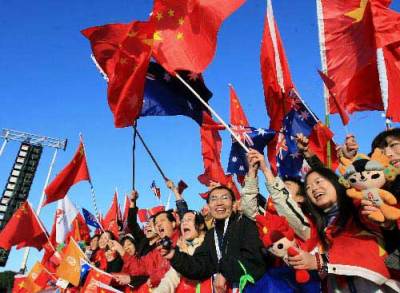 | | Spectators watch the torch relay. |
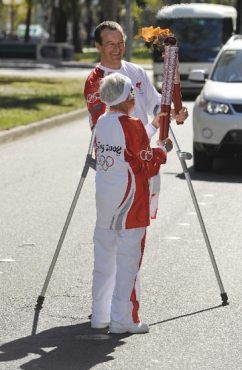 | | A torchbearer carries the torch. |
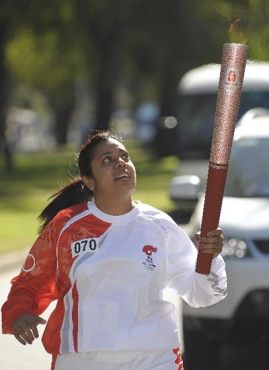 | | A torchbearer carries the torch. |
 | | Spectators watch the torch relay. |
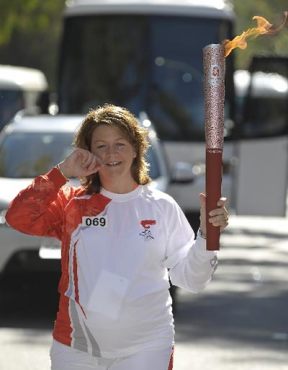 | | A torchbearer carries the torch. |
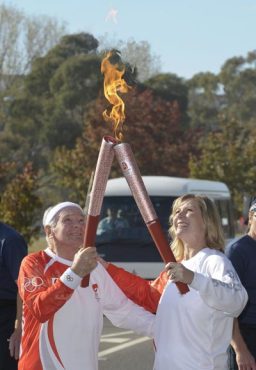 | | A torchbearer carries the torch. |
 | | Spectators watch the torch relay. |
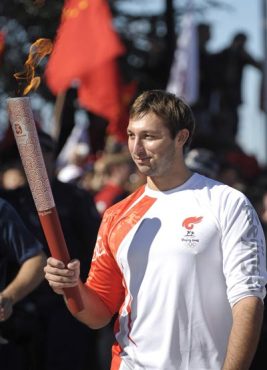 | | The last torchbearer Ian Thorpe, five-time gold medalist, holds up the Olympic torch during the torch relay. |
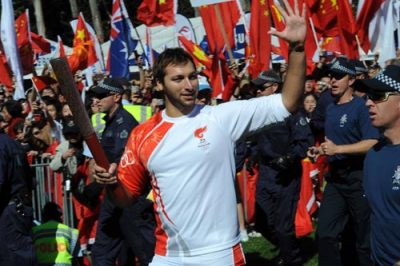 | | The last torchbearer Ian Thorpe, five-time gold medalist, carries the Olympic torch during the torch relay. |
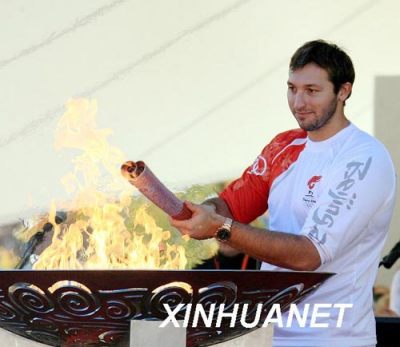 | | Ian Thorpe, five-time gold medalist, runs as the last torch bearer and kindles the torch relay cauldron. |
|
16th leg of the Torch Relay- Nagano, Japan. 26 April 2008
Nagano, which hosted the 1998 Winter Olympics hosted the 16th Torch Relay. Zenkō-ji temple, reconstructed in 1707 and one of the National Treasures of Japan, was to feature prominently in the relay as the starting point, decided to pull out due to concerns about events in Tibet as well as the risk of disruption by violent protests. Parts of the temple were later vandalized.
A new starting point, previously the site of a municipal building and now a parking lot, was chosen by the city. An event the city had planned to hold at the Minami Nagano Sports Park following the torch relay was also canceled out of concern about disruptions caused by demonstrators protesting against China's recent crackdown in Tibet. Thousands of riot police were mobilized to protect the torch along its route. The show of force kept most protesters in check, but slogans shouted by pro-China or pro-Tibet demonstrators, Japanese nationalists, and human rights organizations flooded the air. The torch route was packed with mostly peaceful spectators. The public was not allowed at the parking lot where the relay started.
After the Zenkoji monks held a prayer ceremony for victims of the events in Tibet, pro-Chinese demonstrators yelled "China, go for it!" at pro-Tibet demonstrators who yelled back "Free Tibet." This continued at high volume throughout most of the 5-hour relay. More than 100 police officers ran with the torch and riot police lined the streets while three helicopters flew above. Only two Chinese guards were allowed to accompany the torch because of Japan's concern over their treatment of demonstrators at previous relays. A man with a Tibetan flag tried to stop the torch at the beginning of the relay but was dragged off by police. Some raw eggs were also thrown from the crowd. The Mayor of Nagano, Shoichi Washizawa said that it has become a "great nuisance" for the city to host the torch relay. Washizawa's aides said the mayor's remark was not criticism about the relay itself but about the potential disruptions and confusion surrounding it.
A city employee of the Nagano City Office ridiculed the protests in Europe, he said "...they are doing something foolish", in a televised interview. Nagano City officially apologized later and explained what he had wanted to say was "Such violent protests were not easy to accept".



 |



 |




 |





|
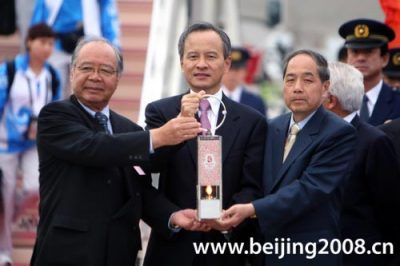 | | Japanese Olympic Committee Vice President Igaya Chiharu(l) and Cui Tiankai(c), Chinese ambassador to Japan and BOCOG Executive Vice-president Li Binghua hold the safety lantern that carries the Beijing Olympic flame at Tokyo's Haneda Airport. |
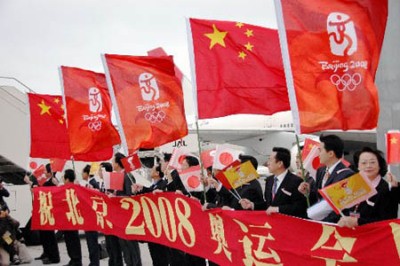 | | Cheering crowds welcome the Olympic flame at the airport in Tokyo. |
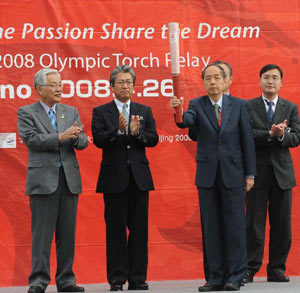 | | BOCOG executive vice-president, Li Binghua, raises the torch. |
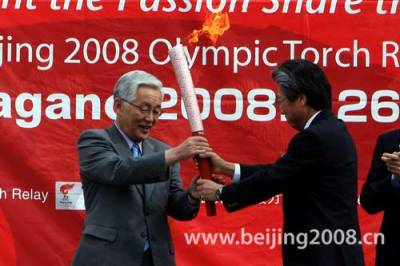 | | Tsunekazu Takeda(r), president of the Japanese Olympic Committee (JOC), hands the torch to Nagano Mayor Shoichi Washizawa. |
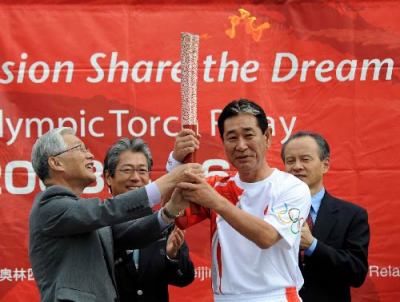 | | Nagano Mayor Shoichi Washizawa hands over the torch to the first torch bearer, Senichi Hoshino(r), manager of the Japan national baseball team. |
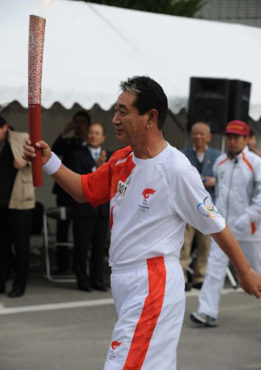 | | The first torch bearer, Senichi Hoshino(r), manager of the Japan national baseball team, carries the torch. |
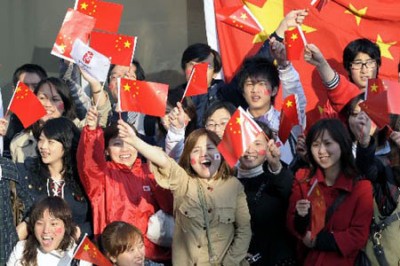 | | Spectators watch the torch relay. |
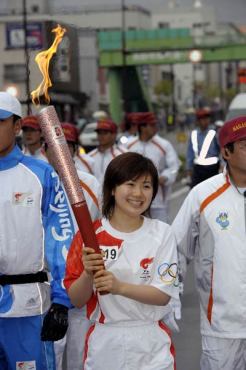 | | Japanese table tennis player Ai Fukuhara carries the torch. |
 | | Torchbearer Shingo Suetsugu carries the torch. |
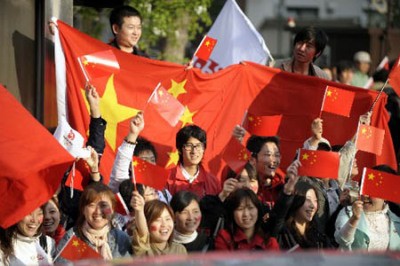 | | Spectators watch the torch relay. |
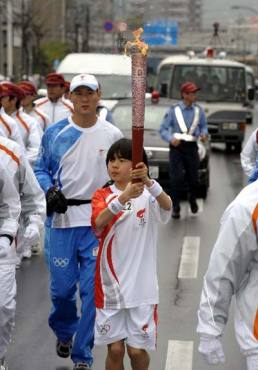 | | A 14-year-old torchbearer carries the torch. |
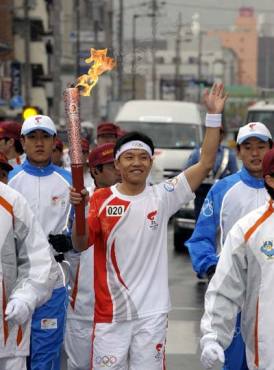 | | Chinese student Zhang Bi carries the torch. |
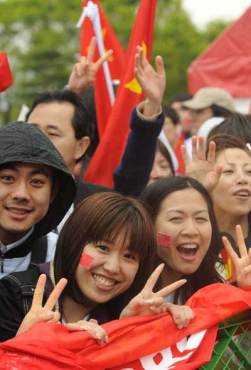 | | Spectators watch the torch relay. |
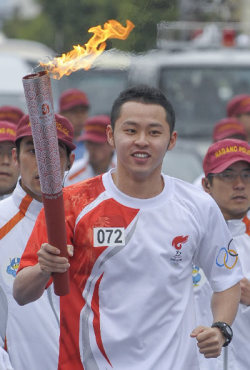 | | Japanese swimmer Kosuke Kitajima, Olympic champion in 2004 Athens Games, carries the torch. |
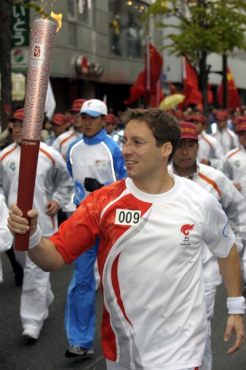 | | The 9th torchbearer carries the torch. |
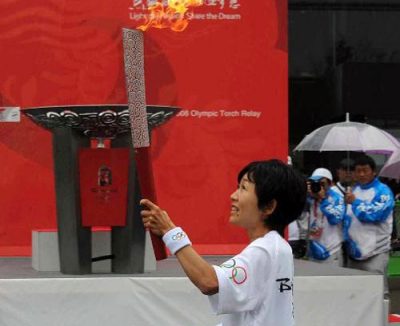 | | The last torchbearer in the relay, Mizuki Noguchi, Athens Olympic women's marathon gold medallist, runs towards the cauldron during the torch relay. |
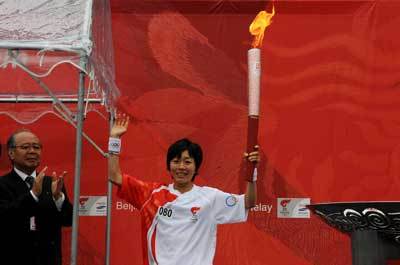 | | The last torchbearer in the relay, Mizuki Noguchi, Athens Olympic women's marathon gold medallist, displays the torch. |
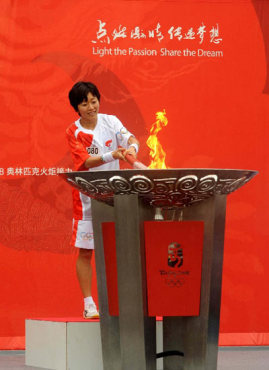 | | The last torchbearer in the relay, Mizuki Noguchi, Athens Olympic women's marathon gold medallist, lights the torch relay cauldron, to conclude the relay. |
|
17th leg of the Torch Relay- Seoul, South Korea. 27 April 2008
More than 8,000 riot police were deployed to guard the 15-mile route, which began at Olympic Park, which was built when Seoul hosted the 1988 Summer Games.
Intended torchbearers Choi Seung-kook and Park Won-sun boycotted the event to protest against the Chinese government's crackdown in Tibet. Chinese students clashed with protesters, throwing rocks, bottles, and punches.
A North Korean defector whose brother defected to China but was captured and executed by the DPRK, attempted to set himself on fire in protest of China's treatment of North Korean refugees. He poured gasoline on himself but police quickly surrounded him and carried him away. Two other demonstrators tried to storm the torch but failed.
Fighting broke out near the beginning of the relay between a group of 500 Chinese supporters and approximately 50 protesters who carried a banner that read: "Free North Korean refugees in China." The students threw stones and water bottles as approximately 2,500 police tried to keep the groups separated. Police said they arrested five people, including a Chinese student who was arrested for allegedly throwing rocks. Thousands of Chinese followed the torch on its 4.5 hour journey, some chanting, "Go China, go Olympics!"


 |


 |



|


 |
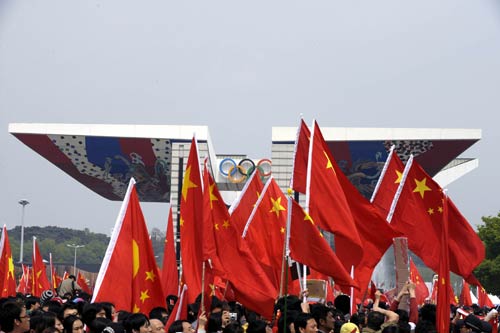 | | Overeseas Chinese holding Chinese national flags wait to watch the Olympic torch relay. |
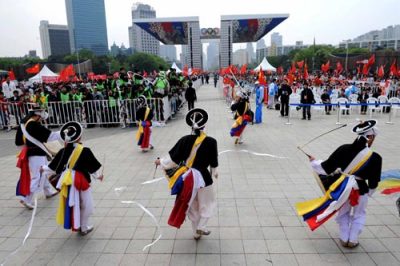 | | Local Koreans perform a traditional dance to welcome the sacred flame during the torch relay. |
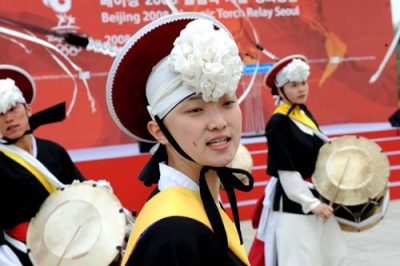 | | Local Koreans perform a traditional dance to welcome the sacred flame during the torch relay. |
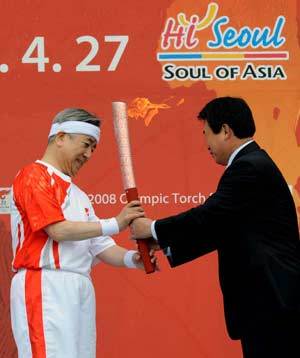 | | Rah Jin-Koor(r), deputy mayor of Seoul, hands the torch to Kim Jung Kil, chairman of South Korea's Olympic Committee, ahead of the Olympic torch relay. |
 | | First torchbearer, Kim Jung Kil, chairman of South Korea's Olympic Committee, hands over the Olympic torch to the second torchbearer, Moon Dae Sung, during the torch relay. |
 | | Second torchbearer, Moon Dae Sung, carries the torch. |
 | | Second torchbearer, Moon Dae Sung, carries the torch. |
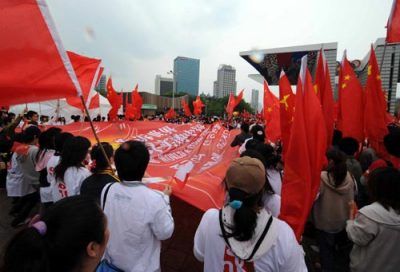 | | Spectators celebrate the torch relay. |
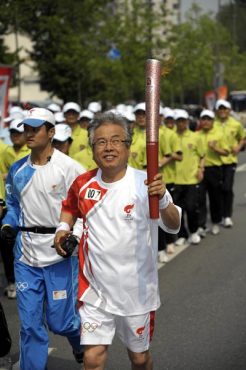 | | The 7th torchbearer carries the torch. |
 | | Torchbearer Lee Hee Ah sits in a wheelchair with the torch during the Olympic torch relay. |
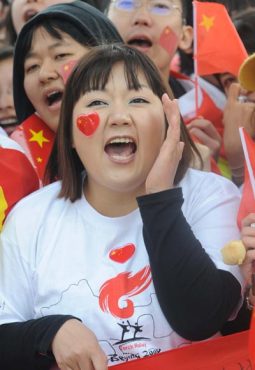 | | Spectators watch the torch relay. |
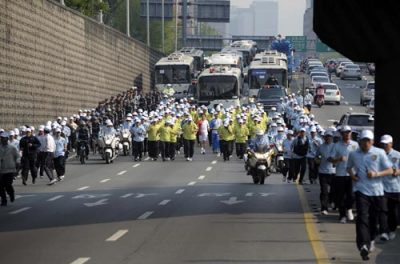 | | Torch relay convoy escorts a torchbearer during the torch relay. |
|
18th leg of the Torch Relay- Pyongyang, North Korea. 28 April 2008
For the first time ever, the Olympic torch went to North Korea, as large crowds in Pyongyang waved red and white flags and cheered the runners.
Presiding over the event was the head of North Korea's rubber-stamp parliament and ceremonial state leader, Kim Yong Nam, according to The Associated Press. He passed the torch to the first runner, Pak Du Ik, who played on North Korea's 1966 World Cup soccer team that made a historic run to the quarterfinals, AP reported.
The 20-kilometer (12-mile) relay began from beneath the larger sculpted flame atop the Juche Tower obelisk, AP reported, adding that the nation's leader, Kim Jong Il, was not seen at the event.



 |



 |



 |


 |
 | | Chinese students in North Korea and local residents cheer the Olympic flame. |
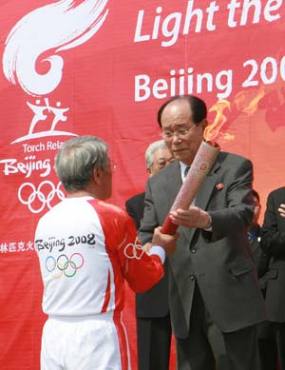 | | Kim Yong Nam(r), president of the Presidium of the Supreme People's Assembly, hands the torch to the first torchbearer, Park Tu Ik. |
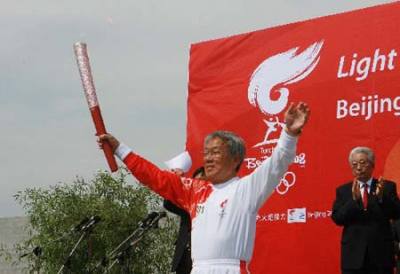 | | The first torchbearer, Park Tu Ik, displays the torch. |
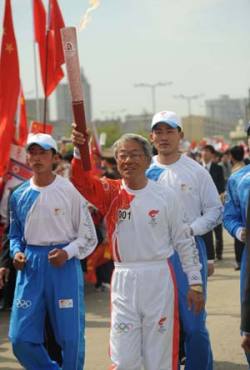 | | First torchbearer Park Tu Ik carries the torch. |
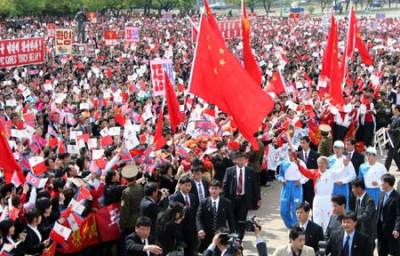 | | First torchbearer Park Tu Ik carries the torch through cheering people. |
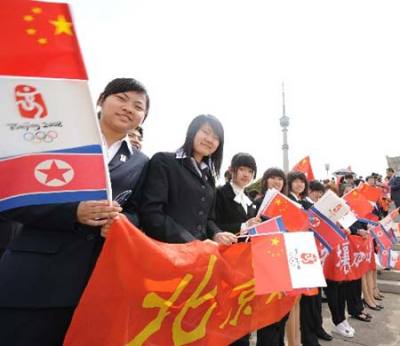 | | Spectators watch the torch relay. |
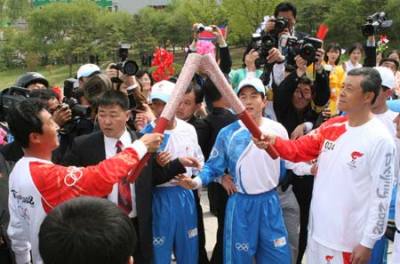 | | Torchbearer Liu Xiaoming(r), Chinese Ambassador to the Democratic People's Republic of Korea (DPRK), relays the Olympic flame at the torch relay. |
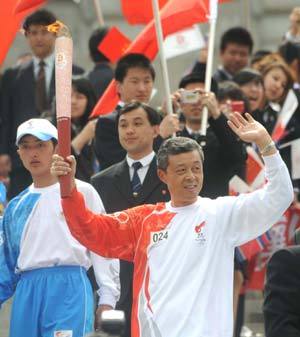 | | Torchbearer Liu Xiaoming, Chinese Ambassador to the Democratic People's Republic of Korea (DPRK), carries the torch. |
 | | Local people wearing traditional costumes cheer for the Olympic torch relay. |
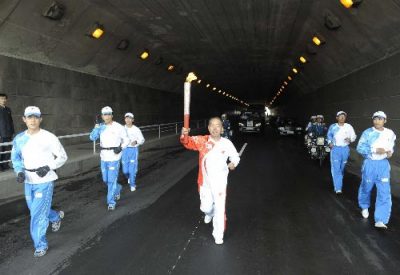 | | Torchbearer Sin Chang Gyun, a model train driver, carries the torch. |
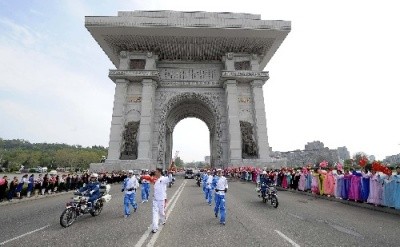 | | Torchbearer Ri Hak Jae carries the torch. |
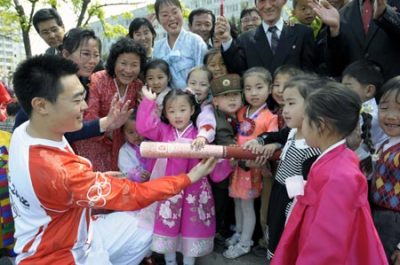 | | Torchbearer Yu Lei(l) is circled by local people after finishing his leg of the Olympic torch relay. |
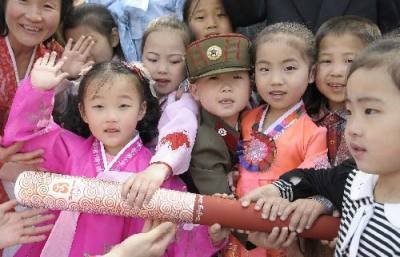 | | Local children pose for a picture with the Beijing Olympic torch. |
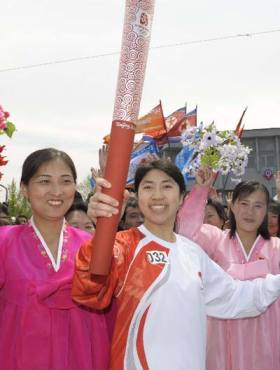 | | Chinese torchbearer Gao Ning poses with local people for a photo during the Olympic torch relay. |
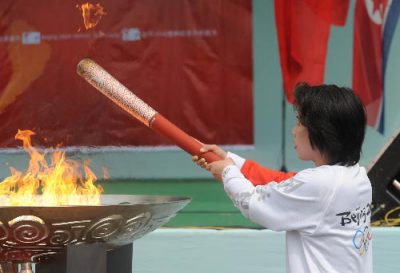 | | The last torchbearer kindles the torch relay cauldron. |
|
19th leg of the Torch Relay- Ho Chi Minh City, Vietnam. 29 April 2008
Some 60 torchbearers carried the torch from the downtown Opera House to the Military Zone 7 Competition Hall stadium near Tan Son Nhat International Airport along an undisclosed route. Vietnam is involved in a territorial dispute with China (and other countries) for sovereignty of the Spratly and Paracel Islands; tensions have risen recently following reports that the Chinese Government had established a county-level city named Sansha in the disputed territories, resulting in anti-Chinese demonstrations in December 2007 in Hanoi and Ho Chi Minh City. However to sustain its relationship with China the Vietnamese government has actively sought to head off protests during the torch relay, with Prime Minister Nguyễn Tấn Dũng warning government agencies that "hostile forces" may try to disrupt the torch relay.
Prior to the rally seven anti-China protestors were arrested in Hanoi after unfurling a banner and shouting "Boycott the Beijing Olympics" through a loudhailer at a market. A Vietnamese American was deported for planning protests against the torch, while a prominent blogger Điếu Cày (real name Nguyễn Văn Hải) who blogged about protests around the world and who called for demonstrations in Vietnam was arrested on charges of tax evasion. Outside Vietnam, there were protests by overseas Vietnamese in Paris, San Francisco and Canberra. Lê Minh Phiếu, a torchbearer who is a Vietnamese law student studying in France wrote a letter to the president of the International Olympic Committee protesting China's "politicisation of the Olympics", citing maps of the torch relay at the official Beijing Olympic website depicting the disputed islands as Chinese territory and posted it on his blog. One day before the relay was to start, the official website appeared to have been updated to remove the disputed islands and dotted lines marking China's maritime claims in the South China Sea.



 |



 |



 |

 |
 | | The plane carrying the Beijing Olympic flame lands Monday night at Tan Son Nhat International Airport of Ho Chi Minh City, Vietnam. Li Binghua(c), executive vice president of the Beijing Organizing Committee of Olympic Games (BOCOG), carries the lantern of the Flame before walking off the plane. |
 | | Actresses perform in the Ho Chi Minh City of Vietnam to welcome the arrival the Olympic flame during the torch relay. |
 | | Flame guards light Olympic torch ahead of the torch relay. |
 | | Nguyen Thi Thu Ha(r), vice mayor of Ho Chi Minh City, receives the torch from Chinese Ambassador to Vietnam Hu Qianwen(l), before running in the torch relay. |
 | | Nguyen Thi Thu Ha(r), vice mayor of Ho Chi Minh City, displays the torch with Chinese Ambassador to Vietnam Hu Qianwen(l), before running in the torch relay. |
 | | Nguyen Thi Thu Ha, vice mayor of Ho Chi Minh City, displays the torch. |
 | | Nguyen Thi Thu Ha, vice mayor of Ho Chi Minh City, carries the torch. |
 | | Spectators watch the torch relay. |
 | | Torchbearer Xu Mingliang, Chinese Consul General of Ho Chi Minh City, carries the torch. |
 | | The 7th torchbearer carries the torch. |
 | | Spectators watch the torch relay. |
 | | Chinese Ambassador to Vietnam Hu Qianwen carries the torch. |
 | | Last torchbearer, Nguyen Danh Thai, chairman of Vietnam's Olympic Committee, lights the torch relay cauldron. |
 | | Two torch escorts retake the flame from the burning cauldron at the end of the torch relay. |
|
Taipei, Taiwan
The planned route originally included a stop in Taipei between Ho Chi Minh City and Hong Kong, but there was disagreement in Beijing and Taipei over language used to describe whether it was an international or a domestic part of the route. While the Olympic committees of China and Taiwan reached initial consensus on the approach, the government of the Republic of China in Taiwan intervened, stating that this placement could be interpreted as placing Taiwan on the same level as Hong Kong and Macau, an implication it objected to. The Beijing Organizing Committee attempted to continue negotiation, but further disputes arose over the placement and usage of the flag or the anthem of the Republic of China along the 24 km torch route in Taiwan.
As of 21 September 2007, after the midnight deadline for concluding the negotiations, Taiwan and China were unable to come to terms with the issue of the Torch Relay. In the end, both sides of the Taiwan Strait decided to eliminate the Taipei leg.
20th leg of the Torch Relay- Hong Kong. 2 May 2008
In the ceremony held at the Hong Kong Cultural Centre in Tsim Sha Tsui, Chief Executive of Hong Kong Donald Tsang handed the torch to the first torchbearer, Olympic medalist Lee Lai Shan. The torch relay then traveled through Nathan Road, Lantau Link, Sha Tin (crossed Shing Mun River via a dragon boat, which had been never used before in the history of Olympic torch relays), Victoria Harbor (crossed by Tin Hau, a VIP vessel managed by the Marine Department) before ending in Golden Bauhinia Square in Wan Chai. A total of 120 torchbearers were selected to participate in the event consisting of celebrities, athletes and members of the pro-Beijing camp politicians. No representatives from the pro-democracy camp were selected as torchbearers. One torchbearer could not participate due to flight delay. It was estimated that more than 200,000 spectators came out and watched the relay. Many enthusiastic supporters wore red shirts and waved large Chinese flags. According to Hong Kong Chief Secretary for Administration Henry Tang, 3,000 police were deployed to ensure order.
There were several protests along the torch relay route. Members of the Hong Kong Alliance in Support of Patriotic Democratic Movements in China, including pro-democracy activist Szeto Wah, waved novelty inflatable plastic Olympic flames, which they said symbolized democracy. They wanted accountability for the Tiananmen Square protests of 1989 and the implementation of democracy in Hong Kong. Political activist and Legislative Council member Leung Kwok-hung (Longhair) also joined the protest, saying "I'm very proud that in Hong Kong we still have people brave enough to speak out. "Pro-democracy activists were overwhelmed by a crowd of torch supporters with insults like "running dog," "traitor," "get out!," and "I love the Communist Party. "At the same time, about 10 members of the Civil Human Rights Front had orange banners calling for human rights improvements and universal suffrage. Onlookers were saying "Aren’t you Chinese?" in Mandarin putonghua as they tried to cover the orange banners with a large Chinese national flag. One woman had an orange sign that said, "Olympic flame for democracy", while a man carried a poster with a tank and the slogan "One world, two dreams". A university student Christina Chan wrapped the Tibetan snow lion flag around her body and later began waving it. Several onlookers heckled Chan, shouting "What kind of Chinese are you?" and "What a shame!" In the end, she and some of the protesters were taken away against their will by the authorities via a police vehicle "for their own protection."
The Color Orange democracy group, led by Danish sculptor Jens Galschiot, originally planned to join the Hong Kong Alliance relay and paint the "Pillar of Shame," a structure he built in Hong Kong to commemorate the 1989 Tiananmen Square massacre. However, Galschiot and two other people were denied entry to Hong Kong on April 26, 2008 due to "immigration reasons" and were forced to leave Hong Kong. In response, Lee Cheuk Yan, vice chairman of the Hong Kong Alliance in Support of Patriotic Democratic Movements in China, said, "It's outrageous that the government is willing to sacrifice the image of Hong Kong because of the torch relay." Hollywood actress Mia Farrow was also briefly questioned at the Hong Kong airport though officials allowed her to enter. She later gave a speech criticizing China's relations with Sudan in Hong Kong, as there was also a small minority of people protesting about China's role in the crisis of Darfur.


 |


 |


 |
 | | A folk art performance at the launching ceremony for the Hong Kong leg of the Olympic torch relay. |
 | | Local students welcome the Olympic flame in Hong Kong. |
 | | Music performance at the start of the launching ceremony. |
 | | Donald Tsang Yam-kuen (r), Chief Executive of the Hong Kong Special Administrative Region applauds as the first torchbearer Lee Lai-shan (c), Hong Kong's first ever Olympic gold medallist, displays the torch at the launching ceremony. |
 | | Yang Shu'an, Executive Vice President of the Beijing Olympic Organizing Committee, displays the torch at the launching ceremony. |
 | | A torchbearer stands on a dragon boat with the torch. |
 | | Former badminton player Chan Nianci hands over the flame to torchbearer, Hong Kong equestrian Cheng Man Kit Kenneth riding on a horse. Adopting the horse is a distinguishing feature of the Hong Kong leg of the torch relay. |
 | | Equstrian Nelson Yip Siu-hong carries the torch on horseback. |
 | | Hong Kong's star cyclist Wong Kam-Po who ran as the last torch bearer, lights the torch relay cauldron among the cheers and applauds from spectators. |
|
21st leg of the Torch Relay- Macau. 3 May 2008
For the first time, an Olympic torch travels to Macau, where the event began with a ceremony held at Macau Fisherman's Wharf. Afterward, the torch traveled through Macau, passing by a number of landmarks includes A-Ma Temple, Macau Tower, Ponte Governador Nobre de Carvalho, Ponte de Sai Van, Macau Cultural Centre, Macau Stadium and then back to the Fisherman's Wharf for the closing ceremony. Parts of the route near Ruins of St. Paul's and Taipa was shortened due to large crowds of supporters blocking narrow streets. A total of 120 torchbearers participated in this event including casino tycoon Stanley Ho. Leong Hong Man and Leong Heng Teng were the first and last torchbearer in the relay respectively. An article published on Macao Daily News criticized that the list of the touchbearers could not fully represent the Macanese and that there were too many non-athletes among the touchbearers, some of whom had already been torchbearers of other sporting events.
A union planned to protest at the relay for better living conditions. Hong Kong legislator Michael Mak Kwok-fung and activist Chan Cheong, both members of the League of Social Democrats, were not allowed to enter Macau. About 2,200 police were deployed on the streets; there were no interruptions.



 |


 |
 | | Flame guards light the torch at the start of the torch relay in Macau. |
 | | Ho Hau Wah, chief executive of the Macau Special Administrative Region, hands over the torch to the first torchbearer. |
 | | Torchbearers pass the flame on a dragon boat. |
 | | Pang Tsz Shan holds the torch on a boat. |
 | | Spectators wait for the torch. |
 | | A torchbearer carries the torch. |
 | | Local people flock to welcome the sacred flame. |
|







































































































































































































































































































































































































































































































































































































































































































































































